- Privacy Policy

Home » Research Questions – Types, Examples and Writing Guide

Research Questions – Types, Examples and Writing Guide
Table of Contents

Research Questions
Definition:
Research questions are the specific questions that guide a research study or inquiry. These questions help to define the scope of the research and provide a clear focus for the study. Research questions are usually developed at the beginning of a research project and are designed to address a particular research problem or objective.
Types of Research Questions
Types of Research Questions are as follows:
Descriptive Research Questions
These aim to describe a particular phenomenon, group, or situation. For example:
- What are the characteristics of the target population?
- What is the prevalence of a particular disease in a specific region?
Exploratory Research Questions
These aim to explore a new area of research or generate new ideas or hypotheses. For example:
- What are the potential causes of a particular phenomenon?
- What are the possible outcomes of a specific intervention?
Explanatory Research Questions
These aim to understand the relationship between two or more variables or to explain why a particular phenomenon occurs. For example:
- What is the effect of a specific drug on the symptoms of a particular disease?
- What are the factors that contribute to employee turnover in a particular industry?
Predictive Research Questions
These aim to predict a future outcome or trend based on existing data or trends. For example :
- What will be the future demand for a particular product or service?
- What will be the future prevalence of a particular disease?
Evaluative Research Questions
These aim to evaluate the effectiveness of a particular intervention or program. For example:
- What is the impact of a specific educational program on student learning outcomes?
- What is the effectiveness of a particular policy or program in achieving its intended goals?
How to Choose Research Questions
Choosing research questions is an essential part of the research process and involves careful consideration of the research problem, objectives, and design. Here are some steps to consider when choosing research questions:
- Identify the research problem: Start by identifying the problem or issue that you want to study. This could be a gap in the literature, a social or economic issue, or a practical problem that needs to be addressed.
- Conduct a literature review: Conducting a literature review can help you identify existing research in your area of interest and can help you formulate research questions that address gaps or limitations in the existing literature.
- Define the research objectives : Clearly define the objectives of your research. What do you want to achieve with your study? What specific questions do you want to answer?
- Consider the research design : Consider the research design that you plan to use. This will help you determine the appropriate types of research questions to ask. For example, if you plan to use a qualitative approach, you may want to focus on exploratory or descriptive research questions.
- Ensure that the research questions are clear and answerable: Your research questions should be clear and specific, and should be answerable with the data that you plan to collect. Avoid asking questions that are too broad or vague.
- Get feedback : Get feedback from your supervisor, colleagues, or peers to ensure that your research questions are relevant, feasible, and meaningful.
How to Write Research Questions
Guide for Writing Research Questions:
- Start with a clear statement of the research problem: Begin by stating the problem or issue that your research aims to address. This will help you to formulate focused research questions.
- Use clear language : Write your research questions in clear and concise language that is easy to understand. Avoid using jargon or technical terms that may be unfamiliar to your readers.
- Be specific: Your research questions should be specific and focused. Avoid broad questions that are difficult to answer. For example, instead of asking “What is the impact of climate change on the environment?” ask “What are the effects of rising sea levels on coastal ecosystems?”
- Use appropriate question types: Choose the appropriate question types based on the research design and objectives. For example, if you are conducting a qualitative study, you may want to use open-ended questions that allow participants to provide detailed responses.
- Consider the feasibility of your questions : Ensure that your research questions are feasible and can be answered with the resources available. Consider the data sources and methods of data collection when writing your questions.
- Seek feedback: Get feedback from your supervisor, colleagues, or peers to ensure that your research questions are relevant, appropriate, and meaningful.
Examples of Research Questions
Some Examples of Research Questions with Research Titles:
Research Title: The Impact of Social Media on Mental Health
- Research Question : What is the relationship between social media use and mental health, and how does this impact individuals’ well-being?
Research Title: Factors Influencing Academic Success in High School
- Research Question: What are the primary factors that influence academic success in high school, and how do they contribute to student achievement?
Research Title: The Effects of Exercise on Physical and Mental Health
- Research Question: What is the relationship between exercise and physical and mental health, and how can exercise be used as a tool to improve overall well-being?
Research Title: Understanding the Factors that Influence Consumer Purchasing Decisions
- Research Question : What are the key factors that influence consumer purchasing decisions, and how do these factors vary across different demographics and products?
Research Title: The Impact of Technology on Communication
- Research Question : How has technology impacted communication patterns, and what are the effects of these changes on interpersonal relationships and society as a whole?
Research Title: Investigating the Relationship between Parenting Styles and Child Development
- Research Question: What is the relationship between different parenting styles and child development outcomes, and how do these outcomes vary across different ages and developmental stages?
Research Title: The Effectiveness of Cognitive-Behavioral Therapy in Treating Anxiety Disorders
- Research Question: How effective is cognitive-behavioral therapy in treating anxiety disorders, and what factors contribute to its success or failure in different patients?
Research Title: The Impact of Climate Change on Biodiversity
- Research Question : How is climate change affecting global biodiversity, and what can be done to mitigate the negative effects on natural ecosystems?
Research Title: Exploring the Relationship between Cultural Diversity and Workplace Productivity
- Research Question : How does cultural diversity impact workplace productivity, and what strategies can be employed to maximize the benefits of a diverse workforce?
Research Title: The Role of Artificial Intelligence in Healthcare
- Research Question: How can artificial intelligence be leveraged to improve healthcare outcomes, and what are the potential risks and ethical concerns associated with its use?
Applications of Research Questions
Here are some of the key applications of research questions:
- Defining the scope of the study : Research questions help researchers to narrow down the scope of their study and identify the specific issues they want to investigate.
- Developing hypotheses: Research questions often lead to the development of hypotheses, which are testable predictions about the relationship between variables. Hypotheses provide a clear and focused direction for the study.
- Designing the study : Research questions guide the design of the study, including the selection of participants, the collection of data, and the analysis of results.
- Collecting data : Research questions inform the selection of appropriate methods for collecting data, such as surveys, interviews, or experiments.
- Analyzing data : Research questions guide the analysis of data, including the selection of appropriate statistical tests and the interpretation of results.
- Communicating results : Research questions help researchers to communicate the results of their study in a clear and concise manner. The research questions provide a framework for discussing the findings and drawing conclusions.
Characteristics of Research Questions
Characteristics of Research Questions are as follows:
- Clear and Specific : A good research question should be clear and specific. It should clearly state what the research is trying to investigate and what kind of data is required.
- Relevant : The research question should be relevant to the study and should address a current issue or problem in the field of research.
- Testable : The research question should be testable through empirical evidence. It should be possible to collect data to answer the research question.
- Concise : The research question should be concise and focused. It should not be too broad or too narrow.
- Feasible : The research question should be feasible to answer within the constraints of the research design, time frame, and available resources.
- Original : The research question should be original and should contribute to the existing knowledge in the field of research.
- Significant : The research question should have significance and importance to the field of research. It should have the potential to provide new insights and knowledge to the field.
- Ethical : The research question should be ethical and should not cause harm to any individuals or groups involved in the study.
Purpose of Research Questions
Research questions are the foundation of any research study as they guide the research process and provide a clear direction to the researcher. The purpose of research questions is to identify the scope and boundaries of the study, and to establish the goals and objectives of the research.
The main purpose of research questions is to help the researcher to focus on the specific area or problem that needs to be investigated. They enable the researcher to develop a research design, select the appropriate methods and tools for data collection and analysis, and to organize the results in a meaningful way.
Research questions also help to establish the relevance and significance of the study. They define the research problem, and determine the research methodology that will be used to address the problem. Research questions also help to determine the type of data that will be collected, and how it will be analyzed and interpreted.
Finally, research questions provide a framework for evaluating the results of the research. They help to establish the validity and reliability of the data, and provide a basis for drawing conclusions and making recommendations based on the findings of the study.
Advantages of Research Questions
There are several advantages of research questions in the research process, including:
- Focus : Research questions help to focus the research by providing a clear direction for the study. They define the specific area of investigation and provide a framework for the research design.
- Clarity : Research questions help to clarify the purpose and objectives of the study, which can make it easier for the researcher to communicate the research aims to others.
- Relevance : Research questions help to ensure that the study is relevant and meaningful. By asking relevant and important questions, the researcher can ensure that the study will contribute to the existing body of knowledge and address important issues.
- Consistency : Research questions help to ensure consistency in the research process by providing a framework for the development of the research design, data collection, and analysis.
- Measurability : Research questions help to ensure that the study is measurable by defining the specific variables and outcomes that will be measured.
- Replication : Research questions help to ensure that the study can be replicated by providing a clear and detailed description of the research aims, methods, and outcomes. This makes it easier for other researchers to replicate the study and verify the results.
Limitations of Research Questions
Limitations of Research Questions are as follows:
- Subjectivity : Research questions are often subjective and can be influenced by personal biases and perspectives of the researcher. This can lead to a limited understanding of the research problem and may affect the validity and reliability of the study.
- Inadequate scope : Research questions that are too narrow in scope may limit the breadth of the study, while questions that are too broad may make it difficult to focus on specific research objectives.
- Unanswerable questions : Some research questions may not be answerable due to the lack of available data or limitations in research methods. In such cases, the research question may need to be rephrased or modified to make it more answerable.
- Lack of clarity : Research questions that are poorly worded or ambiguous can lead to confusion and misinterpretation. This can result in incomplete or inaccurate data, which may compromise the validity of the study.
- Difficulty in measuring variables : Some research questions may involve variables that are difficult to measure or quantify, making it challenging to draw meaningful conclusions from the data.
- Lack of generalizability: Research questions that are too specific or limited in scope may not be generalizable to other contexts or populations. This can limit the applicability of the study’s findings and restrict its broader implications.
About the author
Muhammad Hassan
Researcher, Academic Writer, Web developer
You may also like

Data Collection – Methods Types and Examples

Delimitations in Research – Types, Examples and...

Research Process – Steps, Examples and Tips

Research Design – Types, Methods and Examples

Institutional Review Board – Application Sample...

Evaluating Research – Process, Examples and...
Want to create or adapt books like this? Learn more about how Pressbooks supports open publishing practices.
1-Research Questions
1. The Purpose of Research Questions

Both professional researchers and successful student researchers develop research questions. That’s because research questions are more than handy tools; they are essential to the research process.
By defining exactly what the researcher is trying to find out, these questions influence most of the rest of the steps taken to conduct the research. That’s true even if the research is not for academic purposes but for other areas of our lives.
For instance, if you’re seeking information about a health problem in order to learn whether you have anything to worry about, research questions will make it possible for you to more effectively decide whether to seek medical help–and how quickly.
Or, if you’re researching a potential employer, having developed and used research questions will mean you’re able to more confidently decide whether to apply for an internship or job there.
The confidence you’ll have when making such decisions will come from knowing that the information they’re based on was gathered by conscious thought rather than serendipity and whim.
Choosing & Using Sources: A Guide to Academic Research Copyright © 2015 by Teaching & Learning, Ohio State University Libraries is licensed under a Creative Commons Attribution 4.0 International License , except where otherwise noted.
Share This Book

The Ultimate Guide to Qualitative Research - Part 1: The Basics

- Introduction and overview
- What is qualitative research?
- What is qualitative data?
- Examples of qualitative data
- Qualitative vs. quantitative research
- Mixed methods
- Qualitative research preparation
- Theoretical perspective
- Theoretical framework
- Literature reviews
- Introduction
Why are research questions so important?
Research question examples, types of qualitative research questions, writing a good research question, guiding your research through research questions.
- Conceptual framework
- Conceptual vs. theoretical framework
- Data collection
- Qualitative research methods
- Focus groups
- Observational research
- Case studies
- Ethnographical research
- Ethical considerations
- Confidentiality and privacy
- Power dynamics
- Reflexivity
Research questions
The research question plays a critical role in the research process, as it guides the study design, data collection , analysis , and interpretation of the findings.
A research paper relies on a research question to inform readers of the research topic and the research problem being addressed. Without such a question, your audience may have trouble understanding the rationale for your research project.

People can take for granted the research question as an essential part of a research project. However, explicitly detailing why researchers need a research question can help lend clarity to the research project. Here are some of the key roles that the research question plays in the research process:
Defines the scope and focus of the study
The research question helps to define the scope and focus of the study. It identifies the specific topic or issue that the researcher wants to investigate, and it sets the boundaries for the study. A research question can also help you determine if your study primarily contributes to theory or is more applied in nature. Clinical research and public health research, for example, may be more concerned with research questions that contribute to practice, while a research question focused on cognitive linguistics are aimed at developing theory.
Provides a rationale for the study
The research question provides a rationale for the study by identifying a gap or problem in existing literature or practice that the researcher wants to address. It articulates the purpose and significance of the study, and it explains why the study is important and worth conducting.
Guides the study design
The research question guides the study design by helping the researcher select appropriate research methods , sampling strategies, and data collection tools. It also helps to determine the types of data that need to be collected and the best ways to analyze and interpret the data because the principal aim of the study is to provide an answer to that research question.

Shapes the data analysis and interpretation
The research question shapes the data analysis and interpretation by guiding the selection of appropriate analytical methods and by focusing the interpretation of the findings. It helps to identify which patterns and themes in the data are more relevant and worth digging into, and it guides the development of conclusions and recommendations based on the findings.
Generates new knowledge
The research question is the starting point for generating new knowledge. By answering the research question, the researcher contributes to the body of knowledge in the field and helps to advance the understanding of the topic or issue under investigation.
Overall, the research question is a critical component of the research process, as it guides the study from start to finish and provides a foundation for generating new knowledge.
Supports the thesis statement
The thesis statement or main assertion in any research paper stems from the answers to the research question. As a result, you can think of a focused research question as a preview of what the study aims to present as a new contribution to existing knowledge.
Here area few examples of focused research questions that can help set the stage for explaining different types of research questions in qualitative research . These questions touch upon various fields and subjects, showcasing the versatility and depth of research.
- What factors contribute to the job satisfaction of remote workers in the technology industry?
- How do teachers perceive the implementation of technology in the classroom, and what challenges do they face?
- What coping strategies do refugees use to deal with the challenges of resettlement in a new country?
- How does gentrification impact the sense of community and identity among long-term residents in urban neighborhoods?
- In what ways do social media platforms influence body image and self-esteem among adolescents?
- How do family dynamics and communication patterns affect the management of type 2 diabetes in adult patients?
- What is the role of mentorship in the professional development and career success of early-career academics?
- How do patients with chronic illnesses experience and navigate the healthcare system, and what barriers do they encounter?
- What are the motivations and experiences of volunteers in disaster relief efforts, and how do these experiences impact their future involvement in humanitarian work?
- How do cultural beliefs and values shape the consumer preferences and purchasing behavior of young adults in a globalized market?
- How do individuals whose genetic factors predict a high risk for developing a specific medical condition perceive, cope with, and make lifestyle choices based on this information?
These example research questions highlight the different kinds of inquiries common to qualitative research. They also demonstrate how qualitative research can address a wide range of topics, from understanding the experiences of specific populations to examining the impact of broader social and cultural phenomena.
Also, notice that these types of research questions tend to be geared towards inductive analyses that describe a concept in depth or develop new theory. As such, qualitative research questions tend to ask "what," "why," or "how" types of questions. This contrasts with quantitative research questions that typically aim to verify an existing theory. and tend to ask "when," "how much," and "why" types of questions to nail down causal mechanisms and generalizable findings.
Whatever your research inquiry, turn to ATLAS.ti
Powerful tools to help turn your research question into meaningful analysis, starting with a free trial.
As you can see above, the research questions you ask play a critical role in shaping the direction and depth of your study. These questions are designed to explore, understand, and interpret social phenomena, rather than testing a hypothesis or quantifying data like in quantitative research. In this section, we will discuss the various types of research questions typically found in qualitative research, making it easier for you to craft appropriate questions for your study.
Descriptive questions
Descriptive research questions aim to provide a detailed account of the phenomenon being studied. These questions usually begin with "what" or "how" and seek to understand the nature, characteristics, or functions of a subject. For example, "What are the experiences of first-generation college students?" or "How do small business owners adapt to economic downturns?"
Comparative questions
Comparative questions seek to examine the similarities and differences between two or more groups, cases, or phenomena. These questions often include the words "compare," "contrast," or "differences." For example, "How do parenting practices differ between single-parent and two-parent families?" or "What are the similarities and differences in leadership styles among successful female entrepreneurs?"

Exploratory questions
Exploratory research questions are open-ended and intended to investigate new or understudied areas. These questions aim to identify patterns, relationships, or themes that may warrant further investigation. For example, "How do teenagers use social media to construct their identities?" or "What factors influence the adoption of renewable energy technologies in rural communities?"
Explanatory questions
Explanatory research questions delve deeper into the reasons or explanations behind a particular phenomenon or behavior. They often start with "why" or "how" and aim to uncover underlying motivations, beliefs, or processes. For example, "Why do some employees resist organizational change?" or "How do cultural factors influence decision-making in international business negotiations?"
Evaluative questions
Evaluative questions assess the effectiveness, impact, or outcomes of a particular intervention, program, or policy. They seek to understand the value or significance of an initiative by examining its successes, challenges, or unintended consequences. For example, "How effective is the school's anti-bullying program in reducing incidents of bullying?" or "What are the long-term impacts of a community-based health promotion campaign on residents' well-being?"
Interpretive questions
Interpretive questions focus on understanding how individuals or groups make sense of their experiences, actions, or social contexts. These questions often involve the analysis of language, symbols, or narratives to uncover the meanings and perspectives that shape human behavior. For example, "How do cancer survivors make sense of their illness journey?" or "What meanings do members of a religious community attach to their rituals and practices?"
There are mainly two overarching ways to think about how to devise a research question. Many studies are built on existing research, but others can be founded on personal experiences or pilot research.
Using the literature review
Within scholarly research, the research question is often built from your literature review . An analysis of the relevant literature reporting previous studies should allow you to identify contextual, theoretical, or methodological gaps that can be addressed in future research.

A compelling research question built on a robust literature review ultimately illustrates to your audience what is novel about your study's objectives.
Conducting pilot research
Researchers may conduct preliminary research or pilot research when they are interested in a particular topic but don't yet have a basis for forming a research question on that topic. A pilot study is a small-scale, preliminary study that is conducted in order to test the feasibility of a research design, methods, and procedures. It can help identify unresolved puzzles that merit further investigation, and pilot studies can draw attention to potential issues or problems that may arise in the full study.
One potential benefit of conducting a pilot study in qualitative research is that it can help the researcher to refine their research question. By collecting and analyzing a small amount of data, the researcher can get a better sense of the phenomenon under investigation and can develop a more focused and refined research question for the full study. The pilot study can also help the researcher to identify key themes, concepts, or variables that should be included in the research question.
In addition to helping to refine the research question, a pilot study can also help the researcher to develop a more effective data collection and analysis plan. The researcher can test different methods for collecting and analyzing data, and can make adjustments based on the results of the pilot study. This can help to ensure that the full study is conducted in the most effective and efficient manner possible.
Overall, conducting a pilot study in qualitative research can be a valuable tool for refining the research question and developing a more effective research design, methods, and procedures. It can help to ensure that the full study is conducted in a rigorous and effective manner, and can increase the likelihood of generating meaningful and useful findings.
When you write a research question for your qualitative study, consider which type of question best aligns with your research objectives and the nature of the phenomenon you are investigating. Remember, qualitative research questions should be open-ended, allowing for a range of perspectives and insights to emerge. As you progress in your research, these questions may evolve or be refined based on the data you collect, helping to guide your analysis and deepen your understanding of the topic.

Use ATLAS.ti for every step of your research project
From the research question to the key insights, ATLAS.ti is there for you. See how with a free trial.
Ohio State nav bar
The Ohio State University
- BuckeyeLink
- Find People
- Search Ohio State
Research Questions & Hypotheses
Generally, in quantitative studies, reviewers expect hypotheses rather than research questions. However, both research questions and hypotheses serve different purposes and can be beneficial when used together.
Research Questions
Clarify the research’s aim (farrugia et al., 2010).
- Research often begins with an interest in a topic, but a deep understanding of the subject is crucial to formulate an appropriate research question.
- Descriptive: “What factors most influence the academic achievement of senior high school students?”
- Comparative: “What is the performance difference between teaching methods A and B?”
- Relationship-based: “What is the relationship between self-efficacy and academic achievement?”
- Increasing knowledge about a subject can be achieved through systematic literature reviews, in-depth interviews with patients (and proxies), focus groups, and consultations with field experts.
- Some funding bodies, like the Canadian Institute for Health Research, recommend conducting a systematic review or a pilot study before seeking grants for full trials.
- The presence of multiple research questions in a study can complicate the design, statistical analysis, and feasibility.
- It’s advisable to focus on a single primary research question for the study.
- The primary question, clearly stated at the end of a grant proposal’s introduction, usually specifies the study population, intervention, and other relevant factors.
- The FINER criteria underscore aspects that can enhance the chances of a successful research project, including specifying the population of interest, aligning with scientific and public interest, clinical relevance, and contribution to the field, while complying with ethical and national research standards.
- The P ICOT approach is crucial in developing the study’s framework and protocol, influencing inclusion and exclusion criteria and identifying patient groups for inclusion.
- Defining the specific population, intervention, comparator, and outcome helps in selecting the right outcome measurement tool.
- The more precise the population definition and stricter the inclusion and exclusion criteria, the more significant the impact on the interpretation, applicability, and generalizability of the research findings.
- A restricted study population enhances internal validity but may limit the study’s external validity and generalizability to clinical practice.
- A broadly defined study population may better reflect clinical practice but could increase bias and reduce internal validity.
- An inadequately formulated research question can negatively impact study design, potentially leading to ineffective outcomes and affecting publication prospects.
Checklist: Good research questions for social science projects (Panke, 2018)
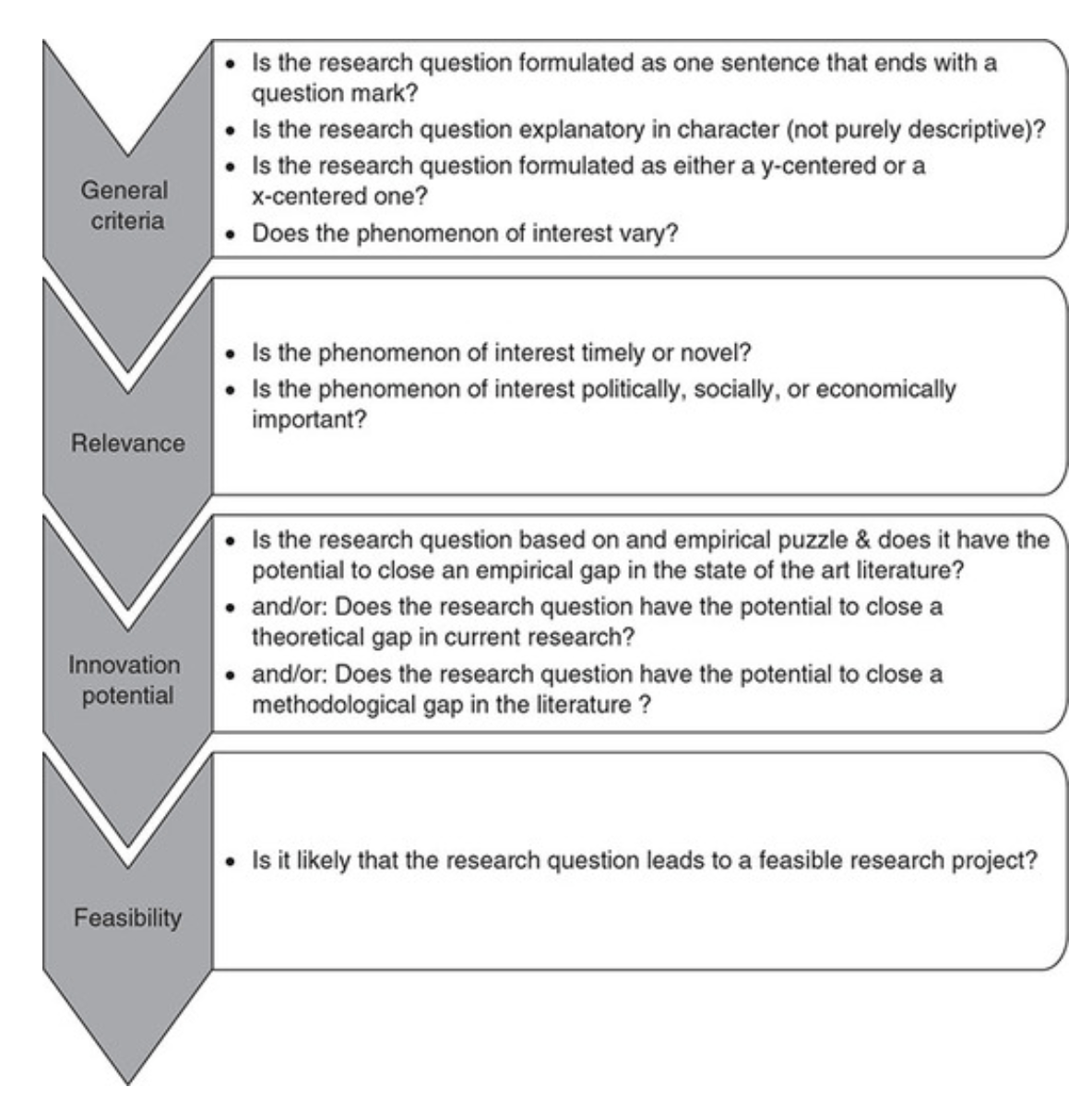
Research Hypotheses
Present the researcher’s predictions based on specific statements.
- These statements define the research problem or issue and indicate the direction of the researcher’s predictions.
- Formulating the research question and hypothesis from existing data (e.g., a database) can lead to multiple statistical comparisons and potentially spurious findings due to chance.
- The research or clinical hypothesis, derived from the research question, shapes the study’s key elements: sampling strategy, intervention, comparison, and outcome variables.
- Hypotheses can express a single outcome or multiple outcomes.
- After statistical testing, the null hypothesis is either rejected or not rejected based on whether the study’s findings are statistically significant.
- Hypothesis testing helps determine if observed findings are due to true differences and not chance.
- Hypotheses can be 1-sided (specific direction of difference) or 2-sided (presence of a difference without specifying direction).
- 2-sided hypotheses are generally preferred unless there’s a strong justification for a 1-sided hypothesis.
- A solid research hypothesis, informed by a good research question, influences the research design and paves the way for defining clear research objectives.
Types of Research Hypothesis
- In a Y-centered research design, the focus is on the dependent variable (DV) which is specified in the research question. Theories are then used to identify independent variables (IV) and explain their causal relationship with the DV.
- Example: “An increase in teacher-led instructional time (IV) is likely to improve student reading comprehension scores (DV), because extensive guided practice under expert supervision enhances learning retention and skill mastery.”
- Hypothesis Explanation: The dependent variable (student reading comprehension scores) is the focus, and the hypothesis explores how changes in the independent variable (teacher-led instructional time) affect it.
- In X-centered research designs, the independent variable is specified in the research question. Theories are used to determine potential dependent variables and the causal mechanisms at play.
- Example: “Implementing technology-based learning tools (IV) is likely to enhance student engagement in the classroom (DV), because interactive and multimedia content increases student interest and participation.”
- Hypothesis Explanation: The independent variable (technology-based learning tools) is the focus, with the hypothesis exploring its impact on a potential dependent variable (student engagement).
- Probabilistic hypotheses suggest that changes in the independent variable are likely to lead to changes in the dependent variable in a predictable manner, but not with absolute certainty.
- Example: “The more teachers engage in professional development programs (IV), the more their teaching effectiveness (DV) is likely to improve, because continuous training updates pedagogical skills and knowledge.”
- Hypothesis Explanation: This hypothesis implies a probable relationship between the extent of professional development (IV) and teaching effectiveness (DV).
- Deterministic hypotheses state that a specific change in the independent variable will lead to a specific change in the dependent variable, implying a more direct and certain relationship.
- Example: “If the school curriculum changes from traditional lecture-based methods to project-based learning (IV), then student collaboration skills (DV) are expected to improve because project-based learning inherently requires teamwork and peer interaction.”
- Hypothesis Explanation: This hypothesis presumes a direct and definite outcome (improvement in collaboration skills) resulting from a specific change in the teaching method.
- Example : “Students who identify as visual learners will score higher on tests that are presented in a visually rich format compared to tests presented in a text-only format.”
- Explanation : This hypothesis aims to describe the potential difference in test scores between visual learners taking visually rich tests and text-only tests, without implying a direct cause-and-effect relationship.
- Example : “Teaching method A will improve student performance more than method B.”
- Explanation : This hypothesis compares the effectiveness of two different teaching methods, suggesting that one will lead to better student performance than the other. It implies a direct comparison but does not necessarily establish a causal mechanism.
- Example : “Students with higher self-efficacy will show higher levels of academic achievement.”
- Explanation : This hypothesis predicts a relationship between the variable of self-efficacy and academic achievement. Unlike a causal hypothesis, it does not necessarily suggest that one variable causes changes in the other, but rather that they are related in some way.
Tips for developing research questions and hypotheses for research studies
- Perform a systematic literature review (if one has not been done) to increase knowledge and familiarity with the topic and to assist with research development.
- Learn about current trends and technological advances on the topic.
- Seek careful input from experts, mentors, colleagues, and collaborators to refine your research question as this will aid in developing the research question and guide the research study.
- Use the FINER criteria in the development of the research question.
- Ensure that the research question follows PICOT format.
- Develop a research hypothesis from the research question.
- Ensure that the research question and objectives are answerable, feasible, and clinically relevant.
If your research hypotheses are derived from your research questions, particularly when multiple hypotheses address a single question, it’s recommended to use both research questions and hypotheses. However, if this isn’t the case, using hypotheses over research questions is advised. It’s important to note these are general guidelines, not strict rules. If you opt not to use hypotheses, consult with your supervisor for the best approach.
Farrugia, P., Petrisor, B. A., Farrokhyar, F., & Bhandari, M. (2010). Practical tips for surgical research: Research questions, hypotheses and objectives. Canadian journal of surgery. Journal canadien de chirurgie , 53 (4), 278–281.
Hulley, S. B., Cummings, S. R., Browner, W. S., Grady, D., & Newman, T. B. (2007). Designing clinical research. Philadelphia.
Panke, D. (2018). Research design & method selection: Making good choices in the social sciences. Research Design & Method Selection , 1-368.
Research Aims, Objectives & Questions
The “Golden Thread” Explained Simply (+ Examples)
By: David Phair (PhD) and Alexandra Shaeffer (PhD) | June 2022
The research aims , objectives and research questions (collectively called the “golden thread”) are arguably the most important thing you need to get right when you’re crafting a research proposal , dissertation or thesis . We receive questions almost every day about this “holy trinity” of research and there’s certainly a lot of confusion out there, so we’ve crafted this post to help you navigate your way through the fog.
Overview: The Golden Thread
- What is the golden thread
- What are research aims ( examples )
- What are research objectives ( examples )
- What are research questions ( examples )
- The importance of alignment in the golden thread
What is the “golden thread”?
The golden thread simply refers to the collective research aims , research objectives , and research questions for any given project (i.e., a dissertation, thesis, or research paper ). These three elements are bundled together because it’s extremely important that they align with each other, and that the entire research project aligns with them.
Importantly, the golden thread needs to weave its way through the entirety of any research project , from start to end. In other words, it needs to be very clearly defined right at the beginning of the project (the topic ideation and proposal stage) and it needs to inform almost every decision throughout the rest of the project. For example, your research design and methodology will be heavily influenced by the golden thread (we’ll explain this in more detail later), as well as your literature review.
The research aims, objectives and research questions (the golden thread) define the focus and scope ( the delimitations ) of your research project. In other words, they help ringfence your dissertation or thesis to a relatively narrow domain, so that you can “go deep” and really dig into a specific problem or opportunity. They also help keep you on track , as they act as a litmus test for relevance. In other words, if you’re ever unsure whether to include something in your document, simply ask yourself the question, “does this contribute toward my research aims, objectives or questions?”. If it doesn’t, chances are you can drop it.
Alright, enough of the fluffy, conceptual stuff. Let’s get down to business and look at what exactly the research aims, objectives and questions are and outline a few examples to bring these concepts to life.

Research Aims: What are they?
Simply put, the research aim(s) is a statement that reflects the broad overarching goal (s) of the research project. Research aims are fairly high-level (low resolution) as they outline the general direction of the research and what it’s trying to achieve .
Research Aims: Examples
True to the name, research aims usually start with the wording “this research aims to…”, “this research seeks to…”, and so on. For example:
“This research aims to explore employee experiences of digital transformation in retail HR.” “This study sets out to assess the interaction between student support and self-care on well-being in engineering graduate students”
As you can see, these research aims provide a high-level description of what the study is about and what it seeks to achieve. They’re not hyper-specific or action-oriented, but they’re clear about what the study’s focus is and what is being investigated.
Need a helping hand?
Research Objectives: What are they?
The research objectives take the research aims and make them more practical and actionable . In other words, the research objectives showcase the steps that the researcher will take to achieve the research aims.
The research objectives need to be far more specific (higher resolution) and actionable than the research aims. In fact, it’s always a good idea to craft your research objectives using the “SMART” criteria. In other words, they should be specific, measurable, achievable, relevant and time-bound”.
Research Objectives: Examples
Let’s look at two examples of research objectives. We’ll stick with the topic and research aims we mentioned previously.
For the digital transformation topic:
To observe the retail HR employees throughout the digital transformation. To assess employee perceptions of digital transformation in retail HR. To identify the barriers and facilitators of digital transformation in retail HR.
And for the student wellness topic:
To determine whether student self-care predicts the well-being score of engineering graduate students. To determine whether student support predicts the well-being score of engineering students. To assess the interaction between student self-care and student support when predicting well-being in engineering graduate students.
As you can see, these research objectives clearly align with the previously mentioned research aims and effectively translate the low-resolution aims into (comparatively) higher-resolution objectives and action points . They give the research project a clear focus and present something that resembles a research-based “to-do” list.

Research Questions: What are they?
Finally, we arrive at the all-important research questions. The research questions are, as the name suggests, the key questions that your study will seek to answer . Simply put, they are the core purpose of your dissertation, thesis, or research project. You’ll present them at the beginning of your document (either in the introduction chapter or literature review chapter) and you’ll answer them at the end of your document (typically in the discussion and conclusion chapters).
The research questions will be the driving force throughout the research process. For example, in the literature review chapter, you’ll assess the relevance of any given resource based on whether it helps you move towards answering your research questions. Similarly, your methodology and research design will be heavily influenced by the nature of your research questions. For instance, research questions that are exploratory in nature will usually make use of a qualitative approach, whereas questions that relate to measurement or relationship testing will make use of a quantitative approach.
Let’s look at some examples of research questions to make this more tangible.
Research Questions: Examples
Again, we’ll stick with the research aims and research objectives we mentioned previously.
For the digital transformation topic (which would be qualitative in nature):
How do employees perceive digital transformation in retail HR? What are the barriers and facilitators of digital transformation in retail HR?
And for the student wellness topic (which would be quantitative in nature):
Does student self-care predict the well-being scores of engineering graduate students? Does student support predict the well-being scores of engineering students? Do student self-care and student support interact when predicting well-being in engineering graduate students?
You’ll probably notice that there’s quite a formulaic approach to this. In other words, the research questions are basically the research objectives “converted” into question format. While that is true most of the time, it’s not always the case. For example, the first research objective for the digital transformation topic was more or less a step on the path toward the other objectives, and as such, it didn’t warrant its own research question.
So, don’t rush your research questions and sloppily reword your objectives as questions. Carefully think about what exactly you’re trying to achieve (i.e. your research aim) and the objectives you’ve set out, then craft a set of well-aligned research questions . Also, keep in mind that this can be a somewhat iterative process , where you go back and tweak research objectives and aims to ensure tight alignment throughout the golden thread.
The importance of strong alignment
Alignment is the keyword here and we have to stress its importance . Simply put, you need to make sure that there is a very tight alignment between all three pieces of the golden thread. If your research aims and research questions don’t align, for example, your project will be pulling in different directions and will lack focus . This is a common problem students face and can cause many headaches (and tears), so be warned.
Take the time to carefully craft your research aims, objectives and research questions before you run off down the research path. Ideally, get your research supervisor/advisor to review and comment on your golden thread before you invest significant time into your project, and certainly before you start collecting data .
Recap: The golden thread
In this post, we unpacked the golden thread of research, consisting of the research aims , research objectives and research questions . You can jump back to any section using the links below.
As always, feel free to leave a comment below – we always love to hear from you. Also, if you’re interested in 1-on-1 support, take a look at our private coaching service here.

Psst... there’s more!
This post was based on one of our popular Research Bootcamps . If you're working on a research project, you'll definitely want to check this out ...
You Might Also Like:

39 Comments
Thank you very much for your great effort put. As an Undergraduate taking Demographic Research & Methodology, I’ve been trying so hard to understand clearly what is a Research Question, Research Aim and the Objectives in a research and the relationship between them etc. But as for now I’m thankful that you’ve solved my problem.
Well appreciated. This has helped me greatly in doing my dissertation.
An so delighted with this wonderful information thank you a lot.
so impressive i have benefited a lot looking forward to learn more on research.
I am very happy to have carefully gone through this well researched article.
Infact,I used to be phobia about anything research, because of my poor understanding of the concepts.
Now,I get to know that my research question is the same as my research objective(s) rephrased in question format.
I please I would need a follow up on the subject,as I intends to join the team of researchers. Thanks once again.
Thanks so much. This was really helpful.
I know you pepole have tried to break things into more understandable and easy format. And God bless you. Keep it up
i found this document so useful towards my study in research methods. thanks so much.
This is my 2nd read topic in your course and I should commend the simplified explanations of each part. I’m beginning to understand and absorb the use of each part of a dissertation/thesis. I’ll keep on reading your free course and might be able to avail the training course! Kudos!
Thank you! Better put that my lecture and helped to easily understand the basics which I feel often get brushed over when beginning dissertation work.
This is quite helpful. I like how the Golden thread has been explained and the needed alignment.
This is quite helpful. I really appreciate!
The article made it simple for researcher students to differentiate between three concepts.
Very innovative and educational in approach to conducting research.
I am very impressed with all these terminology, as I am a fresh student for post graduate, I am highly guided and I promised to continue making consultation when the need arise. Thanks a lot.
A very helpful piece. thanks, I really appreciate it .
Very well explained, and it might be helpful to many people like me.
Wish i had found this (and other) resource(s) at the beginning of my PhD journey… not in my writing up year… 😩 Anyways… just a quick question as i’m having some issues ordering my “golden thread”…. does it matter in what order you mention them? i.e., is it always first aims, then objectives, and finally the questions? or can you first mention the research questions and then the aims and objectives?
Thank you for a very simple explanation that builds upon the concepts in a very logical manner. Just prior to this, I read the research hypothesis article, which was equally very good. This met my primary objective.
My secondary objective was to understand the difference between research questions and research hypothesis, and in which context to use which one. However, I am still not clear on this. Can you kindly please guide?
In research, a research question is a clear and specific inquiry that the researcher wants to answer, while a research hypothesis is a tentative statement or prediction about the relationship between variables or the expected outcome of the study. Research questions are broader and guide the overall study, while hypotheses are specific and testable statements used in quantitative research. Research questions identify the problem, while hypotheses provide a focus for testing in the study.
Exactly what I need in this research journey, I look forward to more of your coaching videos.
This helped a lot. Thanks so much for the effort put into explaining it.
What data source in writing dissertation/Thesis requires?
What is data source covers when writing dessertation/thesis
This is quite useful thanks
I’m excited and thankful. I got so much value which will help me progress in my thesis.
where are the locations of the reserch statement, research objective and research question in a reserach paper? Can you write an ouline that defines their places in the researh paper?
Very helpful and important tips on Aims, Objectives and Questions.
Thank you so much for making research aim, research objectives and research question so clear. This will be helpful to me as i continue with my thesis.
Thanks much for this content. I learned a lot. And I am inspired to learn more. I am still struggling with my preparation for dissertation outline/proposal. But I consistently follow contents and tutorials and the new FB of GRAD Coach. Hope to really become confident in writing my dissertation and successfully defend it.
As a researcher and lecturer, I find splitting research goals into research aims, objectives, and questions is unnecessarily bureaucratic and confusing for students. For most biomedical research projects, including ‘real research’, 1-3 research questions will suffice (numbers may differ by discipline).
Awesome! Very important resources and presented in an informative way to easily understand the golden thread. Indeed, thank you so much.
Well explained
The blog article on research aims, objectives, and questions by Grad Coach is a clear and insightful guide that aligns with my experiences in academic research. The article effectively breaks down the often complex concepts of research aims and objectives, providing a straightforward and accessible explanation. Drawing from my own research endeavors, I appreciate the practical tips offered, such as the need for specificity and clarity when formulating research questions. The article serves as a valuable resource for students and researchers, offering a concise roadmap for crafting well-defined research goals and objectives. Whether you’re a novice or an experienced researcher, this article provides practical insights that contribute to the foundational aspects of a successful research endeavor.
A great thanks for you. it is really amazing explanation. I grasp a lot and one step up to research knowledge.
I really found these tips helpful. Thank you very much Grad Coach.
I found this article helpful. Thanks for sharing this.
thank you so much, the explanation and examples are really helpful
Submit a Comment Cancel reply
Your email address will not be published. Required fields are marked *
Save my name, email, and website in this browser for the next time I comment.
- Print Friendly
- Research Questions: Definitions, Types + [Examples]

Research questions lie at the core of systematic investigation and this is because recording accurate research outcomes is tied to asking the right questions. Asking the right questions when conducting research can help you collect relevant and insightful information that ultimately influences your work, positively.
The right research questions are typically easy to understand, straight to the point, and engaging. In this article, we will share tips on how to create the right research questions and also show you how to create and administer an online questionnaire with Formplus .
What is a Research Question?
A research question is a specific inquiry which the research seeks to provide a response to. It resides at the core of systematic investigation and it helps you to clearly define a path for the research process.
A research question is usually the first step in any research project. Basically, it is the primary interrogation point of your research and it sets the pace for your work.
Typically, a research question focuses on the research, determines the methodology and hypothesis, and guides all stages of inquiry, analysis, and reporting. With the right research questions, you will be able to gather useful information for your investigation.
Types of Research Questions
Research questions are broadly categorized into 2; that is, qualitative research questions and quantitative research questions. Qualitative and quantitative research questions can be used independently and co-dependently in line with the overall focus and objectives of your research.
If your research aims at collecting quantifiable data , you will need to make use of quantitative research questions. On the other hand, qualitative questions help you to gather qualitative data bothering on the perceptions and observations of your research subjects.
Qualitative Research Questions
A qualitative research question is a type of systematic inquiry that aims at collecting qualitative data from research subjects. The aim of qualitative research questions is to gather non-statistical information pertaining to the experiences, observations, and perceptions of the research subjects in line with the objectives of the investigation.
Types of Qualitative Research Questions
- Ethnographic Research Questions
As the name clearly suggests, ethnographic research questions are inquiries presented in ethnographic research. Ethnographic research is a qualitative research approach that involves observing variables in their natural environments or habitats in order to arrive at objective research outcomes.
These research questions help the researcher to gather insights into the habits, dispositions, perceptions, and behaviors of research subjects as they interact in specific environments.
Ethnographic research questions can be used in education, business, medicine, and other fields of study, and they are very useful in contexts aimed at collecting in-depth and specific information that are peculiar to research variables. For instance, asking educational ethnographic research questions can help you understand how pedagogy affects classroom relations and behaviors.
This type of research question can be administered physically through one-on-one interviews, naturalism (live and work), and participant observation methods. Alternatively, the researcher can ask ethnographic research questions via online surveys and questionnaires created with Formplus.
Examples of Ethnographic Research Questions
- Why do you use this product?
- Have you noticed any side effects since you started using this drug?
- Does this product meet your needs?
- Case Studies
A case study is a qualitative research approach that involves carrying out a detailed investigation into a research subject(s) or variable(s). In the course of a case study, the researcher gathers a range of data from multiple sources of information via different data collection methods, and over a period of time.
The aim of a case study is to analyze specific issues within definite contexts and arrive at detailed research subject analyses by asking the right questions. This research method can be explanatory, descriptive , or exploratory depending on the focus of your systematic investigation or research.
An explanatory case study is one that seeks to gather information on the causes of real-life occurrences. This type of case study uses “how” and “why” questions in order to gather valid information about the causative factors of an event.
Descriptive case studies are typically used in business researches, and they aim at analyzing the impact of changing market dynamics on businesses. On the other hand, exploratory case studies aim at providing answers to “who” and “what” questions using data collection tools like interviews and questionnaires.
Some questions you can include in your case studies are:
- Why did you choose our services?
- How has this policy affected your business output?
- What benefits have you recorded since you started using our product?
An interview is a qualitative research method that involves asking respondents a series of questions in order to gather information about a research subject. Interview questions can be close-ended or open-ended , and they prompt participants to provide valid information that is useful to the research.
An interview may also be structured, semi-structured , or unstructured , and this further influences the types of questions they include. Structured interviews are made up of more close-ended questions because they aim at gathering quantitative data while unstructured interviews consist, primarily, of open-ended questions that allow the researcher to collect qualitative information from respondents.
You can conduct interview research by scheduling a physical meeting with respondents, through a telephone conversation, and via digital media and video conferencing platforms like Skype and Zoom. Alternatively, you can use Formplus surveys and questionnaires for your interview.
Examples of interview questions include:
- What challenges did you face while using our product?
- What specific needs did our product meet?
- What would you like us to improve our service delivery?
Quantitative Research Questions
Quantitative research questions are questions that are used to gather quantifiable data from research subjects. These types of research questions are usually more specific and direct because they aim at collecting information that can be measured; that is, statistical information.
Types of Quantitative Research Questions
- Descriptive Research Questions
Descriptive research questions are inquiries that researchers use to gather quantifiable data about the attributes and characteristics of research subjects. These types of questions primarily seek responses that reveal existing patterns in the nature of the research subjects.
It is important to note that descriptive research questions are not concerned with the causative factors of the discovered attributes and characteristics. Rather, they focus on the “what”; that is, describing the subject of the research without paying attention to the reasons for its occurrence.
Descriptive research questions are typically closed-ended because they aim at gathering definite and specific responses from research participants. Also, they can be used in customer experience surveys and market research to collect information about target markets and consumer behaviors.
Descriptive Research Question Examples
- How often do you make use of our fitness application?
- How much would you be willing to pay for this product?
- Comparative Research Questions
A comparative research question is a type of quantitative research question that is used to gather information about the differences between two or more research subjects across different variables. These types of questions help the researcher to identify distinct features that mark one research subject from the other while highlighting existing similarities.
Asking comparative research questions in market research surveys can provide insights on how your product or service matches its competitors. In addition, it can help you to identify the strengths and weaknesses of your product for a better competitive advantage.
The 5 steps involved in the framing of comparative research questions are:
- Choose your starting phrase
- Identify and name the dependent variable
- Identify the groups you are interested in
- Identify the appropriate adjoining text
- Write out the comparative research question
Comparative Research Question Samples
- What are the differences between a landline telephone and a smartphone?
- What are the differences between work-from-home and on-site operations?
- Relationship-based Research Questions
Just like the name suggests, a relationship-based research question is one that inquires into the nature of the association between two research subjects within the same demographic. These types of research questions help you to gather information pertaining to the nature of the association between two research variables.
Relationship-based research questions are also known as correlational research questions because they seek to clearly identify the link between 2 variables.
Read: Correlational Research Designs: Types, Examples & Methods
Examples of relationship-based research questions include:
- What is the relationship between purchasing power and the business site?
- What is the relationship between the work environment and workforce turnover?

Examples of a Good Research Question
Since research questions lie at the core of any systematic investigations, it is important to know how to frame a good research question. The right research questions will help you to gather the most objective responses that are useful to your systematic investigation.
A good research question is one that requires impartial responses and can be answered via existing sources of information. Also, a good research question seeks answers that actively contribute to a body of knowledge; hence, it is a question that is yet to be answered in your specific research context.
- Open-Ended Questions
An open-ended question is a type of research question that does not restrict respondents to a set of premeditated answer options. In other words, it is a question that allows the respondent to freely express his or her perceptions and feelings towards the research subject.
Examples of Open-ended Questions
- How do you deal with stress in the workplace?
- What is a typical day at work like for you?
- Close-ended Questions
A close-ended question is a type of survey question that restricts respondents to a set of predetermined answers such as multiple-choice questions . Close-ended questions typically require yes or no answers and are commonly used in quantitative research to gather numerical data from research participants.
Examples of Close-ended Questions
- Did you enjoy this event?
- How likely are you to recommend our services?
- Very Likely
- Somewhat Likely
- Likert Scale Questions
A Likert scale question is a type of close-ended question that is structured as a 3-point, 5-point, or 7-point psychometric scale . This type of question is used to measure the survey respondent’s disposition towards multiple variables and it can be unipolar or bipolar in nature.
Example of Likert Scale Questions
- How satisfied are you with our service delivery?
- Very dissatisfied
- Not satisfied
- Very satisfied
- Rating Scale Questions
A rating scale question is a type of close-ended question that seeks to associate a specific qualitative measure (rating) with the different variables in research. It is commonly used in customer experience surveys, market research surveys, employee reviews, and product evaluations.
Example of Rating Questions
- How would you rate our service delivery?
Examples of a Bad Research Question
Knowing what bad research questions are would help you avoid them in the course of your systematic investigation. These types of questions are usually unfocused and often result in research biases that can negatively impact the outcomes of your systematic investigation.
- Loaded Questions
A loaded question is a question that subtly presupposes one or more unverified assumptions about the research subject or participant. This type of question typically boxes the respondent in a corner because it suggests implicit and explicit biases that prevent objective responses.
Example of Loaded Questions
- Have you stopped smoking?
- Where did you hide the money?
- Negative Questions
A negative question is a type of question that is structured with an implicit or explicit negator. Negative questions can be misleading because they upturn the typical yes/no response order by requiring a negative answer for affirmation and an affirmative answer for negation.
Examples of Negative Questions
- Would you mind dropping by my office later today?
- Didn’t you visit last week?
- Leading Questions
A l eading question is a type of survey question that nudges the respondent towards an already-determined answer. It is highly suggestive in nature and typically consists of biases and unverified assumptions that point toward its premeditated responses.
Examples of Leading Questions
- If you enjoyed this service, would you be willing to try out our other packages?
- Our product met your needs, didn’t it?
Read More: Leading Questions: Definition, Types, and Examples
How to Use Formplus as Online Research Questionnaire Tool
With Formplus, you can create and administer your online research questionnaire easily. In the form builder, you can add different form fields to your questionnaire and edit these fields to reflect specific research questions for your systematic investigation.
Here is a step-by-step guide on how to create an online research questionnaire with Formplus:
- Sign in to your Formplus accoun t, then click on the “create new form” button in your dashboard to access the Form builder.
- In the form builder, add preferred form fields to your online research questionnaire by dragging and dropping them into the form. Add a title to your form in the title block. You can edit form fields by clicking on the “pencil” icon on the right corner of each form field.
- Save the form to access the customization section of the builder. Here, you can tweak the appearance of your online research questionnaire by adding background images, changing the form font, and adding your organization’s logo.
- Finally, copy your form link and share it with respondents. You can also use any of the multiple sharing options available.
Conclusion
The success of your research starts with framing the right questions to help you collect the most valid and objective responses. Be sure to avoid bad research questions like loaded and negative questions that can be misleading and adversely affect your research data and outcomes.
Your research questions should clearly reflect the aims and objectives of your systematic investigation while laying emphasis on specific contexts. To help you seamlessly gather responses for your research questions, you can create an online research questionnaire on Formplus.

Connect to Formplus, Get Started Now - It's Free!
- abstract in research papers
- bad research questions
- examples of research questions
- types of research questions
- busayo.longe

You may also like:
Research Summary: What Is It & How To Write One
Introduction A research summary is a requirement during academic research and sometimes you might need to prepare a research summary...

How to Write An Abstract For Research Papers: Tips & Examples
In this article, we will share some tips for writing an effective abstract, plus samples you can learn from.
How to do a Meta Analysis: Methodology, Pros & Cons
In this article, we’ll go through the concept of meta-analysis, what it can be used for, and how you can use it to improve how you...
How to Write a Problem Statement for your Research
Learn how to write problem statements before commencing any research effort. Learn about its structure and explore examples
Formplus - For Seamless Data Collection
Collect data the right way with a versatile data collection tool. try formplus and transform your work productivity today..

The Plagiarism Checker Online For Your Academic Work
Start Plagiarism Check
Editing & Proofreading for Your Research Paper
Get it proofread now
Online Printing & Binding with Free Express Delivery
Configure binding now
- Academic essay overview
- The writing process
- Structuring academic essays
- Types of academic essays
- Academic writing overview
- Sentence structure
- Academic writing process
- Improving your academic writing
- Titles and headings
- APA style overview
- APA citation & referencing
- APA structure & sections
- Citation & referencing
- Structure and sections
- APA examples overview
- Commonly used citations
- Other examples
- British English vs. American English
- Chicago style overview
- Chicago citation & referencing
- Chicago structure & sections
- Chicago style examples
- Citing sources overview
- Citation format
- Citation examples
- College essay overview
- Application
- How to write a college essay
- Types of college essays
- Commonly confused words
- Definitions
- Dissertation overview
- Dissertation structure & sections
- Dissertation writing process
- Graduate school overview
- Application & admission
- Study abroad
- Master degree
- Harvard referencing overview
- Language rules overview
- Grammatical rules & structures
- Parts of speech
- Punctuation
- Methodology overview
- Analyzing data
- Experiments
- Observations
- Inductive vs. Deductive
- Qualitative vs. Quantitative
- Types of validity
- Types of reliability
- Sampling methods
- Theories & Concepts
- Types of research studies
- Types of variables
- MLA style overview
- MLA examples
- MLA citation & referencing
- MLA structure & sections
- Plagiarism overview
- Plagiarism checker
- Types of plagiarism
- Printing production overview
- Research bias overview
- Types of research bias
- Example sections
- Types of research papers
- Research process overview
- Problem statement
- Research proposal
- Research topic
- Statistics overview
- Levels of measurment
- Frequency distribution
- Measures of central tendency
- Measures of variability
- Hypothesis testing
- Parameters & test statistics
- Types of distributions
- Correlation
- Effect size
- Hypothesis testing assumptions
- Types of ANOVAs
- Types of chi-square
- Statistical data
- Statistical models
- Spelling mistakes
- Tips overview
- Academic writing tips
- Dissertation tips
- Sources tips
- Working with sources overview
- Evaluating sources
- Finding sources
- Including sources
- Types of sources
Your Step to Success
Plagiarism Check within 10min
Printing & Binding with 3D Live Preview
Research Questions – Definition, Examples & Tips
How do you like this article cancel reply.
Save my name, email, and website in this browser for the next time I comment.

At the heart of every research endeavor lies a fundamental driving force: the research question. It not only defines the scope and direction of inquiry, it also inspires people to seek knowledge. In the complex journey of the research process , key questions act as guiding stars. In this article, we’ll cover everything you need to know about research questions and provide various examples.
Inhaltsverzeichnis
- 1 Research Questions in a nutshell
- 2 Definition: Research Question
- 3 Characteristics of a Research Question
- 4 How to Create a Research Question
- 5 Types of Research Questions
- 6 Example Questions
- 7 Research Frameworks
- 8 Dos & Donts
- 9 Sub-Questions
- 10 Tips for a Good Research Question
Research Questions in a nutshell
A research question is a clear and concise inquiry around which you center a research study. It helps to define the scope of the study and provides a basis for gathering and analyzing a variety of data.
Definition: Research Question
A research question is a concise inquiry that guides the direction of a research study or investigation. It articulates the specific type of subject that the researcher aims to explore, often framed in a way that suggests investigation or analysis . It serves as a fundamental element in the research process, guiding the selection of appropriate methodologies, the collection of evidence, and the interpretation of results. In essence, a research question serves as the starting point for scholarly inquiry, driving the pursuit of knowledge and understanding within a particular field.
Characteristics of a Research Question
The characteristics of a research question play a pivotal role in shaping the direction and success of a research study. The inquiry not only guides the research process, but also ensures its effectiveness in addressing key issues within the field of study.
It should serve three key purposes:
- Interesting : It should stimulate curiosity and appeal from both the researcher and the audience, motivating researchers to explore the topic further. It also increases the likelihood of commitment from both sides, fostering a deeper understanding and appreciation of the research topic.
- Well-defined : A well-defined research question provides clarity and focus, ensuring that the research study addresses a specific aspect of the topic. This helps avoid ambiguity and ensures that the research process is coherent and purposeful.
- Tractable : By ensuring tractability, researchers can conduct the study effectively, maximizing the likelihood of achieving meaningful results. Tractable research questions are also more likely to lead to successful completion of the study, avoiding setbacks due to unattainable goals.
Furthermore, a good research topic should answer three questions:
- Why is this question significant within the context of the field?
- How does your research build upon and enhance the current body of literature?
- What tangible outcomes can be expected if the question is thoroughly investigated and answered?
By answering these questions and ensuring that your research question is interesting, well-defined, and tractable, you can establish the relevance and significance of your research within the field.
How to Create a Research Question
Formulating an impactful research inquiry can be quite difficult. Nevertheless, by employing a comprehensive multistep approach, this task may turn out to be more manageable for you.
1. Identify a broad topic
Begin by identifying a broad area of interest within your field of study and generate questions based on curiosity and knowledge gaps. This could be based on current trends in the field or gaps in existing literature.
2. Conduct background research
Explore existing literature related to your topic to understand what has already been studied and what questions remain unanswered. This will help you identify potential gaps or areas for further exploration, and narrow your focus . Consider the characteristics mentioned earlier.
3. Consider your audience
Reflect on who your specific target audience is — whether it’s academic researchers or the general public. Tailor your research question to be relevant and accessible for your primary audience, considering their interests and level of expertise.
4. Narrow down the focus
Gradually narrow down your topic to a specific research question or a couple of questions based on the gaps found in existing research.
5. Define your questions
Now that you have found your niche, consider all the steps above and start asking open-ended “how” and “why” questions about your topic. A framework such as SMART Goals , PICOT , or FINER , which we will elaborate on in a later section more thoroughly, might be helpful when generating your key questions.
6. Evaluate your question
Now that you have written down your questions, evaluate them to establish if they are effective or if they need further refinement . For this step, look at the characteristics above again, and determine if they answer all the questions and check all the boxes. Is the research question well-defined and interesting to you and your audience? Think about the possible paths your research could take, which is the question, that effectively captures the essence of your research and aligns with your overarching objectives? It shouldn’t be too broad and also not easily answerable with quick searches.
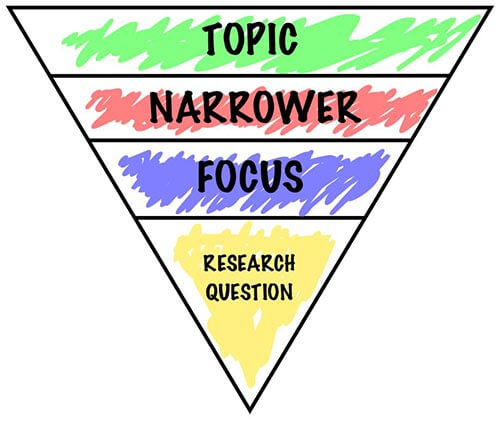
Types of Research Questions
Research questions can be classified into various types, depending on the types of studies to be undertaken. Below, we will discuss each one of them, and their specifics.
Qualitative
Quantitative, mixed-methods.
A qualitative question is concerned with comprehending a phenomenon , and focuses on finding , explaining , and exploring . Qualitative research is primarily used in social sciences and uses open-ended research questions, and seeks to uncover rich and descriptive data .
The most common types of qualitative questions include:
- Exploratory questions , which seek to understand without influencing the results. The objective is to investigate an issue that has limited existing knowledge, and is typically conducted at the preliminary stages of a research process without research bias .
- Predictive questions , which seek to understand the intent or future outcome around a topic. The objective here it to use past information to predict reactions to hypothetical events.
- Interpretive questions , which aim to understand people’s behavior in a natural setting. The objective is to gather feedback on a group’s behavior without affecting the outcome.
A quantitative question is used to prove or disprove a researcher’s hypothesis through descriptions , comparisons , and relationships . It typically involves the population to be studied, identifying independent vs. dependent variables , and the research design. Quantitative questions are created to express the causality between variables and whether this relationship is relevant.
The most common types of quantitative questions include:
- Descriptive questions , which aim to explain when, where, why, or how something occurred, are the most basic type of quantitative research. They use numerical data and statistical analysis to describe a phenomenon, and their objective is to provide a clear and detailed description of a particular phenomenon.
- Comparative questions are used to compare groups or dependent variables to identify similarities, differences, or relationships between them. Their objective is to uncover the “how” or “why” of a topic by examining variations or relationships.
- Relationship-based questions , such as causal and correlational questions, try to answer whether one variable influences another. These types of questions are used in experimental or in quasi-experimental design studies, to focus on understanding how they are connected or influence each other.
Mixed methods research involves the integration of both qualitative and quantitative approaches within a single study, and for this reason, it’s a popular research method for researching nowadays. Mixed methods research combines both quantitative and qualitative data to explore a research question more thoroughly, and is often used in the behavioral, health, and social sciences.
Mixed methods research questions can help you achieve a more comprehensive picture than a standalone quantitative or qualitative question. However, they can be difficult to implement and come with the same risk of research bias as standalone studies.
Example Questions
In this section, we will provide you with numerous research question examples for each type of quantitative, qualitative, and mixed-method question.
Exploratory Question
- What are the factors influencing employee satisfaction in a new startup company?
Predictive Question
- How much can high schoolers’ GPA and grades predict their academic college performance?
Interpretive Question
- How do cultural beliefs shape peoples view of mental health and help-seeking behaviors?
Descriptive Question
- What are the demographics of students enrolled in online courses at a university?
Comparative Question
- How does lecture-style teaching compare to interactive learning in math comprehension?
Relationship-based Question
- What’s the correlation between social media use and young adults’ feelings of loneliness?
Mixed-Methods Questions
- How does the implementation of a new online learning platform (quantitative) impact student engagement and satisfaction (qualitative) in undergraduate courses?
- How do the perceptions of teachers (qualitative) and the academic performance of students (quantitative) vary across different teaching methodologies?
- How do cultural beliefs and values (qualitative) influence consumer purchasing behavior (quantitative) in the cosmetics industry?
Sample Format
Crafting effective research inquiries is most important for guiding your study and achieving your research goals. Below, you’ll find various question formats, designed to inspire and guide your inquiry. Refer to the accompanying picture for a comprehensive range of question formats suitable for a variety of research purposes and contexts.
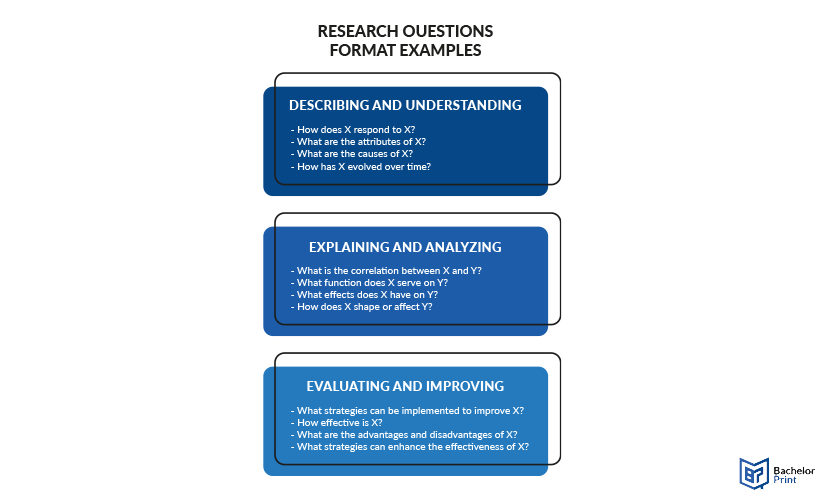
Research Frameworks
There are three types of frameworks you can use as foundational elements to ensure that your research question is succinct.
- The PICO framework, which stands for P opulation, I ntervention, C omparison, and O utcome, is commonly used in healthcare research to structure clinical questions. It helps researchers define the key elements of a research question, including the population of interest, the intervention, or exposure being studied, the comparison group, and the outcome of interest.
- The SMART framework, which stands for S pecific, M easurable, A chievable, R elevant, and T ime-bound, is widely used and helps ensure that the question is clear, quantifiable, feasible, aligned with the research objectives, and has a defined time frame for completion.
- The FINER framework, which stands for F easible, I nteresting, N ovel, E thical, and R elevant, provides criteria for evaluating the quality and appropriateness of research questions. It ensures that the question is feasible to address, interesting and relevant to the field, innovative, ethically sound, and directly related tot the research objectives.
Below, we have illustrated each framework with appropriate questions you can ask yourself in order to find out if your research question can be improved.
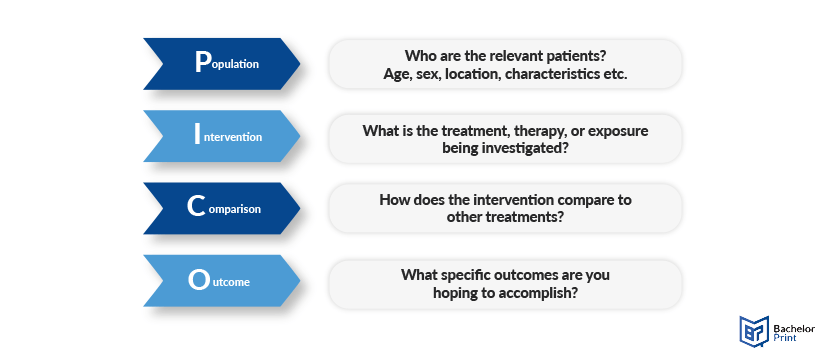
Dos & Donts
Below you’ll find an illustration depicting what you should do and what you should not do when it comes to research questions.
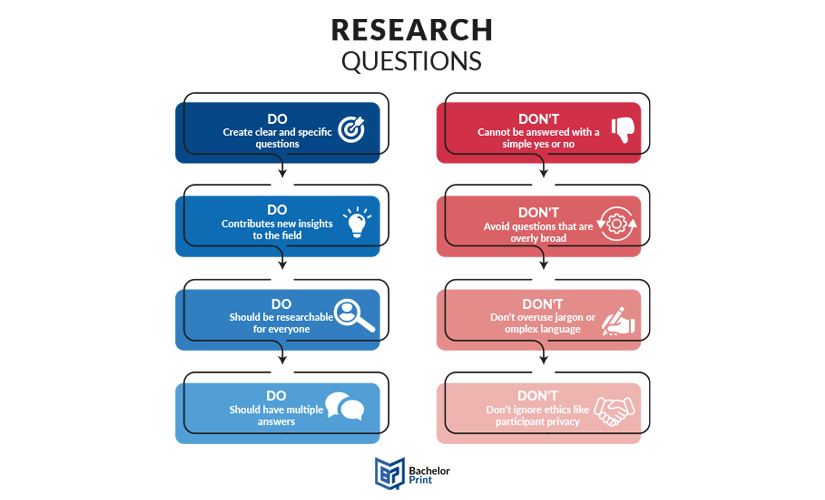
Below you’ll find a table with numerous good and bad examples of research questions together with explanations for each of them.
Sub-Questions
Sub-questions can be essential in research for clarifying complex topics and providing depth to the analysis when your main research question can’t be answered all at once. They are optional and should be used only if necessary to address the main question. If the main question is straightforward, sub-questions can be omitted. Let’s say that the main research question is “How has the transition to online schooling during COVID-19 pandemic affected sophomore and junior students’ academic performance and engagement?”. Some potential sub-questions could be:
- What impact has online schooling had on grades and test scores during the pandemic?
- How has student participation in classes changed with online schooling?
- How effectively have teachers adapted their instruction methods for online teaching?
Tips for a Good Research Question
Crafting a good research inquiry is a critical step in conducting a successful research project, as we have learned. The selection of successful research topics is crucial for guiding the direction of a study and ensuring that the research addresses relevant issues within the field. Here are some general tips to help you develop a strong research question.
- Be specific and clear : A good question should allow for focused study and straightforward answers. Avoid being broad or vague since this could lead to a sprawling investigation.
- Make it measurable : Your research question should be framed in a way that allows for gathering and analyzing data. It should be possible to measure the aspects of the question through available methods.
- Ensure relevance : The question should be relevant to current issues or contribute to a field of study that interests you. It should address a gap in knowledge or add a new perspective to existing studies.
- Test your question : Before finalizing your research question, test it. Discuss it with peers, mentors, or through preliminary literature reviews to ensure it is focused and engaging.
The most important thing is that whatever subject you focus on, it should be interesting to you and your field. Because that way, the writing and analyzing process will be much more enjoyable and rewarding.
Note: Do not figure out your research question after you have finished your research paper.

What are 5 good research questions?
- What impact does incorporating technology into classroom instruction have on student engagement and academic performance in elementary schools?
- How does mindfulness-based stress reduction therapy compare to cognitive-behavioral therapy in reducing symptoms of anxiety and depression among young adults?
- What are the long-term effects of microplastic pollution on marine biodiversity in coastal ecosystems, and how can we mitigate these effects?
- To what extent do socioeconomic factors influence access to healthcare services among marginalized communities, and what policy interventions could address these disparities?
- How do leadership styles and organizational culture impact employee job satisfaction rates in remote work settings?
What is a research question?
A well-developed research question identifies the main issue that the researchers want to investigate and provides a framework for gathering data to address that issue and also proposes a conclusive solution depending on the research type. It serves as a foundation for the writing process and guides the research project.
What types of research questions are there?
Research questions can be classified into three types:
- Descriptive research questions
- Quantitative research questions
- Mixed-methods research questions
What are 6 research questions?
- Descriptive questions
- Comparative questions
- Relationship-based questions
- Exploratory questions
- Predictive questions
- Interpretive questions
We use cookies on our website. Some of them are essential, while others help us to improve this website and your experience.
- External Media
Individual Privacy Preferences
Cookie Details Privacy Policy Imprint
Here you will find an overview of all cookies used. You can give your consent to whole categories or display further information and select certain cookies.
Accept all Save
Essential cookies enable basic functions and are necessary for the proper function of the website.
Show Cookie Information Hide Cookie Information
Statistics cookies collect information anonymously. This information helps us to understand how our visitors use our website.
Content from video platforms and social media platforms is blocked by default. If External Media cookies are accepted, access to those contents no longer requires manual consent.
Privacy Policy Imprint
80 fascinating psychology research questions for your next project
Last updated
15 February 2024
Reviewed by
Brittany Ferri, PhD, OTR/L
Psychology research is essential for furthering our understanding of human behavior and improving the diagnosis and treatment of psychological conditions.
When psychologists know more about how different social and cultural factors influence how humans act, think, and feel, they can recommend improvements to practices in areas such as education, sport, healthcare, and law enforcement.
Below, you will find 80 research question examples across 16 branches of psychology. First, though, let’s look at some tips to help you select a suitable research topic.
- How to choose a good psychology research topic
Psychology has many branches that break down further into topics. Choosing a topic for your psychology research paper can be daunting because there are so many to choose from. It’s an important choice, as the topic you select will open up a range of questions to explore.
The tips below can help you find a psychology research topic that suits your skills and interests.
Tip #1: Select a topic that interests you
Passion and interest should fuel every research project. A topic that fascinates you will most likely interest others as well. Think about the questions you and others might have and decide on the issues that matter most. Draw on your own interests, but also keep your research topical and relevant to others.
Don’t limit yourself to a topic that you already know about. Instead, choose one that will make you want to know more and dig deeper. This will keep you motivated and excited about your research.
Tip #2: Choose a topic with a manageable scope
If your topic is too broad, you can get overwhelmed by the amount of information available and have trouble maintaining focus. On the other hand, you may find it difficult to find enough information if you choose a topic that is too narrow.
To determine if the topic is too broad or too narrow, start researching as early as possible. If you find there’s an overwhelming amount of research material, you’ll probably need to narrow the topic down. For example, instead of researching the general population, it might be easier to focus on a specific age group. Ask yourself what area of the general topic interests you most and focus on that.
If your scope is too narrow, try to generalize or focus on a larger related topic. Expand your search criteria or select additional databases for information. Consider if the topic is too new to have much information published on it as well.
Tip #3: Select a topic that will produce useful and relevant insights
Doing some preliminary research will reveal any existing research on the topic. If there is existing research, will you be able to produce new insights? You might need to focus on a different area or see if the existing research has limitations that you can overcome.
Bear in mind that finding new information from which to draw fresh insights may be impossible if your topic has been over-researched.
You’ll also need to consider whether your topic is relevant to current trends and needs. For example, researching psychology topics related to social media use may be highly relevant today.
- 80 psychology research topics and questions
Psychology is a broad subject with many branches and potential areas of study. Here are some of them:
Developmental
Personality
Experimental
Organizational
Educational
Neuropsychology
Controversial topics
Below we offer some suggestions on research topics and questions that can get you started. Keep in mind that these are not all-inclusive but should be personalized to fit the theme of your paper.
Social psychology research topics and questions
Social psychology has roots as far back as the 18th century. In simple terms, it’s the study of how behavior is influenced by the presence and behavior of others. It is the science of finding out who we are, who we think we are, and how our perceptions affect ourselves and others. It looks at personalities, relationships, and group behavior.
Here are some potential research questions and paper titles for this topic:
How does social media use impact perceptions of body image in male adolescents?
2. Is childhood bullying a risk factor for social anxiety in adults?
Is homophobia in individuals caused by genetic or environmental factors?
What is the most important psychological predictor of a person’s willingness to donate to charity?
Does a person’s height impact how other people perceive them? If so, how?
Cognitive psychology research questions
Cognitive psychology is the branch that focuses on the interactions of thinking, emotion, creativity, and problem-solving. It also explores the reasons humans think the way they do.
This topic involves exploring how people think by measuring intelligence, thoughts, and cognition.
Here are some research question ideas:
6. Is there a link between chronic stress and memory function?
7. Can certain kinds of music trigger memories in people with memory loss?
8. Do remote meetings impact the efficacy of team decision-making?
9. Do word games and puzzles slow cognitive decline in adults over the age of 80?
10. Does watching television impact a child’s reading ability?
Developmental psychology research questions
Developmental psychology is the study of how humans grow and change over their lifespan. It usually focuses on the social, emotional, and physical development of babies and children, though it can apply to people of all ages. Developmental psychology is important for understanding how we learn, mature, and adapt to changes.
Here are some questions that might inspire your research:
11. Does grief accelerate the aging process?
12. How do parent–child attachment patterns influence the development of emotion regulation in teenagers?
13. Does bilingualism affect cognitive decline in adults over the age of 70?
14. How does the transition to adulthood impact decision-making abilities
15. How does early exposure to music impact mental health and well-being in school-aged children?
Personality psychology research questions
Personality psychology studies personalities, how they develop, their structures, and the processes that define them. It looks at intelligence, disposition, moral beliefs, thoughts, and reactions.
The goal of this branch of psychology is to scientifically interpret the way personality patterns manifest into an individual’s behaviors. Here are some example research questions:
16. Nature vs. nurture: Which impacts personality development the most?
17. The role of genetics on personality: Does an adopted child take on their biological parents’ personality traits?
18. How do personality traits influence leadership styles and effectiveness in organizational settings?
19. Is there a relationship between an individual’s personality and mental health?
20. Can a chronic illness affect your personality?
Abnormal psychology research questions
As the name suggests, abnormal psychology is a branch that focuses on abnormal behavior and psychopathology (the scientific study of mental illness or disorders).
Abnormal behavior can be challenging to define. Who decides what is “normal”? As such, psychologists in this area focus on the level of distress that certain behaviors may cause, although this typically involves studying mental health conditions such as depression, obsessive-compulsive disorder (OCD), and phobias.
Here are some questions to consider:
21. How does technology impact the development of social anxiety disorder?
22. What are the factors behind the rising incidence of eating disorders in adolescents?
23. Are mindfulness-based interventions effective in the treatment of PTSD?
24. Is there a connection between depression and gambling addiction?
25. Can physical trauma cause psychopathy?
Clinical psychology research questions
Clinical psychology deals with assessing and treating mental illness or abnormal or psychiatric behaviors. It differs from abnormal psychology in that it focuses more on treatments and clinical aspects, while abnormal psychology is more behavioral focused.
This is a specialty area that provides care and treatment for complex mental health conditions. This can include treatment, not only for individuals but for couples, families, and other groups. Clinical psychology also supports communities, conducts research, and offers training to promote mental health. This category is very broad, so there are lots of topics to explore.
Below are some example research questions to consider:
26. Do criminals require more specific therapies or interventions?
27. How effective are selective serotonin reuptake inhibitors in treating mental health disorders?
28. Are there any disadvantages to humanistic therapy?
29. Can group therapy be more beneficial than one-on-one therapy sessions?
30. What are the factors to consider when selecting the right treatment plan for patients with anxiety?
Experimental psychology research questions
Experimental psychology deals with studies that can prove or disprove a hypothesis. Psychologists in this field use scientific methods to collect data on basic psychological processes such as memory, cognition, and learning. They use this data to test the whys and hows of behavior and how outside factors influence its creation.
Areas of interest in this branch relate to perception, memory, emotion, and sensation. The below are example questions that could inspire your own research:
31. Do male or female parents/carers have a more calming influence on children?
32. Will your preference for a genre of music increase the more you listen to it?
33. What are the psychological effects of posting on social media vs. not posting?
34. How is productivity affected by social connection?
35. Is cheating contagious?
Organizational psychology research questions
Organizational psychology studies human behavior in the workplace. It is most frequently used to evaluate an employee, group, or a company’s organizational dynamics. Researchers aim to isolate issues and identify solutions.
This area of study can be beneficial to both employees and employers since the goal is to improve the overall work environment and experience. Researchers apply psychological principles and findings to recommend improvements in performance, communication, job satisfaction, and safety.
Some potential research questions include the following:
36. How do different leadership styles affect employee morale?
37. Do longer lunch breaks boost employee productivity?
38. Is gender an antecedent to workplace stress?
39. What is the most effective way to promote work–life balance among employees?
40. How do different organizational structures impact the effectiveness of communication, decision-making, and productivity?
Forensic psychology research questions
Some questions to consider exploring in this branch of psychology are:
41. How does incarceration affect mental health?
42. Is childhood trauma a driver for criminal behavior during adulthood?
43. Are people with mental health conditions more likely to be victims of crimes?
44. What are the drivers of false memories, and how do they impact the justice system?
45. Is the media responsible for copycat crimes?
Educational psychology research questions
Educational psychology studies children in an educational setting. It covers topics like teaching methods, aptitude assessment, self-motivation, technology, and parental involvement.
Research in this field of psychology is vital for understanding and optimizing learning processes. It informs educators about cognitive development, learning styles, and effective teaching strategies.
Here are some example research questions:
46. Are different teaching styles more beneficial for children at different times of the day?
47. Can listening to classical music regularly increase a student’s test scores?
48. Is there a connection between sugar consumption and knowledge retention in students?
49. Does sleep duration and quality impact academic performance?
50. Does daily meditation at school influence students’ academic performance and mental health?
Sports psychology research question examples
Sport psychology aims to optimize physical performance and well-being in athletes by using cognitive and behavioral practices and interventions. Some methods include counseling, training, and clinical interventions.
Research in this area is important because it can improve team and individual performance, resilience, motivation, confidence, and overall well-being
Here are some research question ideas for you to consider:
51. How can a famous coach affect a team’s performance?
52. How can athletes control negative emotions in violent or high-contact sports?
53. How does using social media impact an athlete’s performance and well-being?
54. Can psychological interventions help with injury rehabilitation?
55. How can mindfulness practices boost sports performance?
Cultural psychology research question examples
The premise of this branch of psychology is that mind and culture are inseparable. In other words, people are shaped by their cultures, and their cultures are shaped by them. This can be a complex interaction.
Cultural psychology is vital as it explores how cultural context shapes individuals’ thoughts, behaviors, and perceptions. It provides insights into diverse perspectives, promoting cross-cultural understanding and reducing biases.
Here are some ideas that you might consider researching:
56. Are there cultural differences in how people perceive and deal with pain?
57. Are different cultures at increased risk of developing mental health conditions?
58. Are there cultural differences in coping strategies for stress?
59. Do our different cultures shape our personalities?
60. How does multi-generational culture influence family values and structure?
Health psychology research question examples
Health psychology is a crucial field of study. Understanding how psychological factors influence health behaviors, adherence to medical treatments, and overall wellness enables health experts to develop effective interventions and preventive measures, ultimately improving health outcomes.
Health psychology also aids in managing stress, promoting healthy behaviors, and optimizing mental health, fostering a holistic approach to well-being.
Here are five ideas to inspire research in this field:
61. How can health psychology interventions improve lifestyle behaviors to prevent cardiovascular diseases?
62. What role do social norms play in vaping among adolescents?
63. What role do personality traits play in the development and management of chronic pain conditions?
64. How do cultural beliefs and attitudes influence health-seeking behaviors in diverse populations?
65. What are the psychological factors influencing the adherence to preventive health behaviors, such as vaccination and regular screenings?
Neuropsychology research paper question examples
Neuropsychology research explores how a person’s cognition and behavior are related to their brain and nervous system. Researchers aim to advance the diagnosis and treatment of behavioral and cognitive effects of neurological disorders.
Researchers may work with children facing learning or developmental challenges, or with adults with declining cognitive abilities. They may also focus on injuries or illnesses of the brain, such as traumatic brain injuries, to determine the effect on cognitive and behavioral functions.
Neuropsychology informs diagnosis and treatment strategies for conditions such as dementia, traumatic brain injuries, and psychiatric disorders. Understanding the neural basis of behavior enhances our ability to optimize cognitive functioning, rehabilitate people with brain injuries, and improve patient care.
Here are some example research questions to consider:
66. How do neurotransmitter imbalances in specific brain regions contribute to mood disorders such as depression?
67. How can a traumatic brain injury affect memory?
68. What neural processes underlie attention deficits in people with ADHD?
69. Do medications affect the brain differently after a traumatic brain injury?
70. What are the behavioral effects of prolonged brain swelling?
Psychology of religion research question examples
The psychology of religion is a field that studies the interplay between belief systems, spirituality, and mental well-being. It explores the application of the psychological methods and interpretive frameworks of religious traditions and how they relate to both religious and non-religious people.
Psychology of religion research contributes to a holistic understanding of human experiences. It fosters cultural competence and guides therapeutic approaches that respect diverse spiritual beliefs.
Here are some example research questions in this field:
71. What impact does a religious upbringing have on a child’s self-esteem?
72. How do religious beliefs shape decision-making and perceptions of morality?
73. What is the impact of religious indoctrination?
74. Is there correlation between religious and mindfulness practices?
75. How does religious affiliation impact attitudes towards mental health treatment and help-seeking behaviors?
Controversial topics in psychology research question examples
Some psychology topics don’t fit into any of the subcategories above, but they may still be worthwhile topics to consider. These topics are the ones that spark interest, conversation, debate, and disagreement. They are often inspired by current issues and assess the validity of older research.
Consider some of these research question examples:
76. How does the rise in on-screen violence impact behavior in adolescents.
77. Should access to social media platforms be restricted in children under the age of 12 to improve mental health?
78. Are prescription mental health medications over-prescribed in older adults? If so, what are the effects of this?
79. Cognitive biases in AI: what are the implications for decision-making?
80. What are the psychological and ethical implications of using virtual reality in exposure therapy for treating trauma-related conditions?
- Inspiration for your next psychology research project
You can choose from a diverse range of research questions that intersect and overlap across various specialties.
From cognitive psychology to clinical studies, each inquiry contributes to a deeper understanding of the human mind and behavior. Importantly, the relevance of these questions transcends individual disciplines, as many findings offer insights applicable across multiple areas of study.
As health trends evolve and societal needs shift, new topics emerge, fueling continual exploration and discovery. Diving into this ever-changing and expanding area of study enables you to navigate the complexities of the human experience and pave the way for innovative solutions to the challenges of tomorrow.
Editor’s picks
Last updated: 11 January 2024
Last updated: 15 January 2024
Last updated: 25 November 2023
Last updated: 12 May 2023
Last updated: 30 April 2024
Last updated: 18 May 2023
Last updated: 10 April 2023
Latest articles
Related topics, .css-je19u9{-webkit-align-items:flex-end;-webkit-box-align:flex-end;-ms-flex-align:flex-end;align-items:flex-end;display:-webkit-box;display:-webkit-flex;display:-ms-flexbox;display:flex;-webkit-flex-direction:row;-ms-flex-direction:row;flex-direction:row;-webkit-box-flex-wrap:wrap;-webkit-flex-wrap:wrap;-ms-flex-wrap:wrap;flex-wrap:wrap;-webkit-box-pack:center;-ms-flex-pack:center;-webkit-justify-content:center;justify-content:center;row-gap:0;text-align:center;max-width:671px;}@media (max-width: 1079px){.css-je19u9{max-width:400px;}.css-je19u9>span{white-space:pre;}}@media (max-width: 799px){.css-je19u9{max-width:400px;}.css-je19u9>span{white-space:pre;}} decide what to .css-1kiodld{max-height:56px;display:-webkit-box;display:-webkit-flex;display:-ms-flexbox;display:flex;-webkit-align-items:center;-webkit-box-align:center;-ms-flex-align:center;align-items:center;}@media (max-width: 1079px){.css-1kiodld{display:none;}} build next, decide what to build next.

Users report unexpectedly high data usage, especially during streaming sessions.

Users find it hard to navigate from the home page to relevant playlists in the app.

It would be great to have a sleep timer feature, especially for bedtime listening.

I need better filters to find the songs or artists I’m looking for.
Log in or sign up
Get started for free

Gain-of -function research is more than just tweaking risky viruses – it’s a routine and essential tool in all biology research
Associate Professor of Microbiology and Immunology at Emory University and Adjunct Professor Microbiology and Molecular Genetics, University of Pittsburgh
Associate Professor of Microbiology and Immunology, Emory University
Disclosure statement
Seema Lakdawala receives funding from National Institutes of Health and the Flu Lab.
Anice Lowen receives research funding from the National Institutes of Health and Flu Lab.
University of Pittsburgh provides funding as a member of The Conversation US.
View all partners
The term “gain of function” is often taken to refer to research with viruses that puts society at risk of an infectious disease outbreak for questionable gain. Some research on emerging viruses can result in variants that gain the ability to infect people but this does not necessarily mean the research is dangerous or that it is not fruitful. Concerns have focused on lab research on the virus that causes bird flu in 2012 and on the virus that causes COVID-19 since 2020. The National Institutes of Health had previously implemented a three-year moratorium on gain-of-function research on certain viruses, and some U.S. legislatures have proposed bills prohibiting gain-of-function research on “potentially pandemic pathogens.”
The possibility that a genetically modified virus could escape the lab needs to be taken seriously. But it does not mean that gain-of-function experiments are inherently risky or the purview of mad scientists. In fact, gain-of-function approaches are a fundamental tool in biology used to study much more than just viruses, contributing to many, if not most, modern discoveries in the field, including penicillin , cancer immunotherapies and drought-resistant crops .
As scientists who study viruses , we believe that misunderstanding the term “gain of function” as something nefarious comes at the cost of progress in human health, ecological sustainability and technological advancement. Clarifying what gain-of-function research really is can help clarify why it is an essential scientific tool.
What is gain of function?
To study how a living thing operates, scientists can change a specific part of it and then observe the effects. These changes sometimes result in the organism’s gaining a function it didn’t have before or losing a function it once had.
For example, if the goal is to enhance the tumor-killing ability of immune cells, researchers can take a sample of a person’s immune cells and modify them to express a protein that specifically targets cancer cells. This mutated immune cell, called a CAR-T cell thereby “gains the function” of being able to bind to cancerous cells and kill them. The advance of similar immunotherapies that help the immune system attack cancer cells is based on the exploratory research of scientists who synthesized such “ Frankenstein” proteins in the 1980s. At that time, there was no way to know how useful these chimeric proteins would be to cancer treatment today, some 40 years later.
Similarly, by adding specific genes into rice, corn or wheat plants that increase their production in diverse climates, scientists have been able to produce plants that are able to grow and thrive in geographical regions they previously could not. This is a critical advance to maintain food supplies in the face of climate change. Well-known examples of food sources that have their origins in gain-of-function research include rice plants that can grow in high flood plains or in drought conditions or that contain vitamin A to reduce malnutrition.
Medical advances from gain-of-function research
Gain-of-function experiments are ingrained in the scientific process. In many instances, the benefits that stem from gain-of-function experiments are not immediately clear. Only decades later does the research bring a new treatment to the clinic or a new technology within reach.
The development of most antibiotics have relied on the manipulation of bacteria or mold in gain-of-function experiments. Alexander Fleming’s initial discovery that the mold Penicillium rubens could produce a compound toxic to bacteria was a profound medical advance. But it wasn’t until scientists experimented with growth conditions and mold strains that therapeutic use of penicillin became feasible. Using a specific growth medium allowed the mold to gain the function of increased penicillin production, which was essential for its mass production and widespread use as a drug.

Research on antibiotic resistance also relies heavily on gain-of-function approaches. Studying how bacteria gain resistance against drugs is essential to developing new treatments microbes are unable to evade quickly.
Gain-of-function research in virology has also been critical to the advancement of science and health. Oncolytic viruses are genetically modified in the laboratory to infect and kill cancerous cells like melanoma. Similarly, the Johnson & Johnson COVID-19 vaccine contains an adenovirus altered to produce the spike protein that helps the COVID-19 virus infect cells. Scientists developed live attenuated flu vaccines by adapting them to grow at low temperatures and thereby lose the ability to grow at human lung temperatures.
By giving viruses new functions, scientists were able to develop new tools to treat and prevent disease.
Nature’s gain-of-function experiments
Gain-of-function approaches are needed to advance understanding of viruses in part because these processes already occur in nature.
Many viruses that infect such nonhuman animals as bats, pigs, birds and mice have the potential to spill over into people . Every time a virus copies its genome, it makes mistakes. Most of these mutations are detrimental – they reduce a virus’s ability to replicate – but some may allow a virus to replicate faster or better in human cells. Variant viruses with these rare, beneficial mutations will spread better than other variants and therefore come to dominate the viral population – that is how natural selection works .
If these viruses can replicate even a little bit within people, they have the potential to adapt and thereby thrive in their new human hosts. That is nature’s gain-of-function experiment, and it is happening constantly .
Gain-of-function experiments in the lab can help scientists anticipate the changes viruses may undergo in nature by understanding what specific features allow them to transmit between people and infect them. In contrast to nature’s experiments, these are conducted in highly controlled lab conditions designed to limit infection risk to laboratory personnel and others, including air flow control, personal protective equipment and waste sterilization.

It is important that researchers carefully observe lab safety to minimize the theoretical risk of infecting the general population. It is equally important that virologists continue to apply the tools of modern science to gauge the risk of natural viral spillovers before they become outbreaks.
A bird flu outbreak is currently raging across multiple continents. While the H5N1 virus is primarily infecting birds, some people have gotten sick too. More spillover events can change the virus in ways that would allow it to transmit more efficiently among people , potentially leading to a pandemic.
Scientists have a better appreciation of the tangible risk of bird flu spillover because of gain-of-function experiments published a decade ago . Those lab studies showed that bird flu viruses could be transmitted through the air between ferrets within a few feet of one another. They also revealed multiple features of the evolutionary path the H5N1 virus would need to take before it becomes transmissible in mammals, informing what signatures researchers need to look out for during surveillance of the current outbreak.
Oversight on gain of function
Perhaps this sounds like a semantic argument, and in many respects it is. Many researchers would likely agree that gain of function as a general tool is an important way to study biology that should not be restricted, while also arguing that it should be curtailed for research on specific dangerous pathogens. The problem with this argument is that pathogen research needs to include gain-of-function approaches in order to be effective – just as in any area of biology.
Oversight of gain-of-function research on potential pandemic pathogens already exists. Multiple layers of safety measures at the institutional and national levels minimize the risks of virus research.
While updates to current oversight are not unreasonable, we believe that blanket bans or additional restrictions on gain-of-function research do not make society safer. They may instead slow research in areas ranging from cancer therapies to agriculture. Clarifying which specific research areas are of concern regarding gain-of-function approaches can help identify how the current oversight framework can be improved.
- Antibiotics
- Avian flu H5N1
- Golden rice
- Immunotherapy
- Cancer immunotherapy
- Penicillin antibiotics
- Laboratory studies
- COVID-19 vaccines
- Gain-of-function
- Gain of function

Events and Communications Coordinator

Assistant Editor - 1 year cadetship

Executive Dean, Faculty of Health

Lecturer/Senior Lecturer, Earth System Science (School of Science)

Sydney Horizon Educators (Identified)
Featured Topics
Featured series.
A series of random questions answered by Harvard experts.
Explore the Gazette
Read the latest.
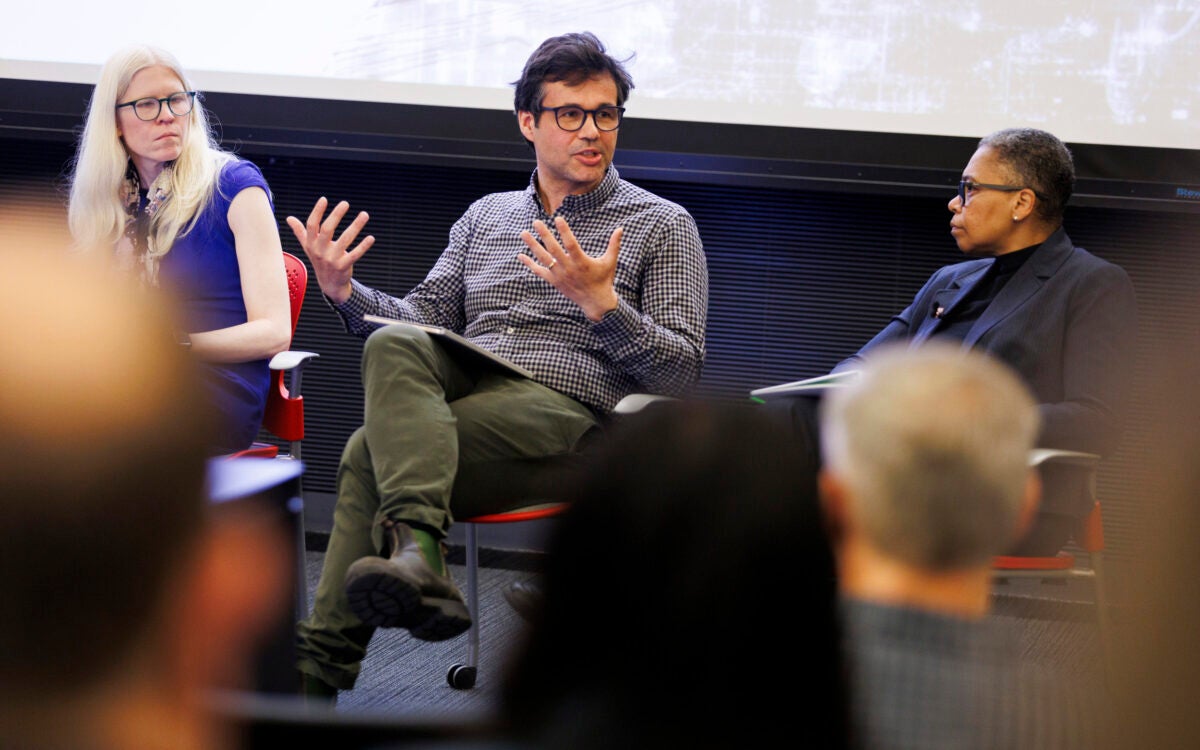
What is ‘original scholarship’ in the age of AI?

Complex questions, innovative approaches

Early warning sign of extinction?
Epic science inside a cubic millimeter of brain.
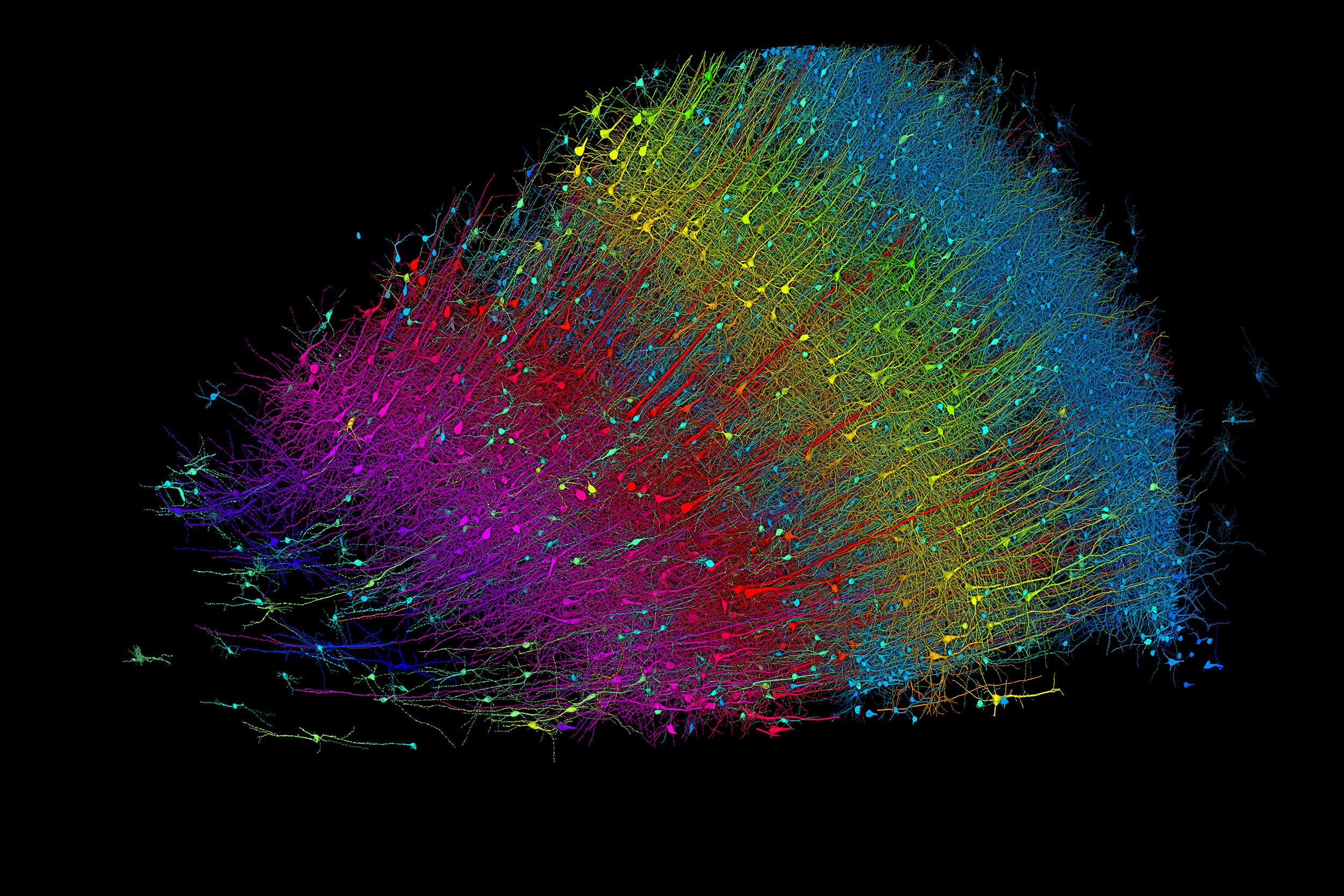
Six layers of excitatory neurons color-coded by depth.
Credit: Google Research and Lichtman Lab
Anne J. Manning
Harvard Staff Writer
Researchers publish largest-ever dataset of neural connections
A cubic millimeter of brain tissue may not sound like much. But considering that that tiny square contains 57,000 cells, 230 millimeters of blood vessels, and 150 million synapses, all amounting to 1,400 terabytes of data, Harvard and Google researchers have just accomplished something stupendous.
Led by Jeff Lichtman, the Jeremy R. Knowles Professor of Molecular and Cellular Biology and newly appointed dean of science , the Harvard team helped create the largest 3D brain reconstruction to date, showing in vivid detail each cell and its web of connections in a piece of temporal cortex about half the size of a rice grain.
Published in Science, the study is the latest development in a nearly 10-year collaboration with scientists at Google Research, combining Lichtman’s electron microscopy imaging with AI algorithms to color-code and reconstruct the extremely complex wiring of mammal brains. The paper’s three first co-authors are former Harvard postdoc Alexander Shapson-Coe, Michał Januszewski of Google Research, and Harvard postdoc Daniel Berger.
The ultimate goal, supported by the National Institutes of Health BRAIN Initiative , is to create a comprehensive, high-resolution map of a mouse’s neural wiring, which would entail about 1,000 times the amount of data the group just produced from the 1-cubic-millimeter fragment of human cortex.
“The word ‘fragment’ is ironic,” Lichtman said. “A terabyte is, for most people, gigantic, yet a fragment of a human brain — just a minuscule, teeny-weeny little bit of human brain — is still thousands of terabytes.”

Jeff Lichtman.
Kris Snibbe/Harvard Staff Photographer
The latest map contains never-before-seen details of brain structure, including a rare but powerful set of axons connected by up to 50 synapses. The team also noted oddities in the tissue, such as a small number of axons that formed extensive whorls. Because the sample was taken from a patient with epilepsy, the researchers don’t know whether such formations are pathological or simply rare.
Lichtman’s field is connectomics, which seeks to create comprehensive catalogs of brain structure, down to individual cells. Such completed maps would unlock insights into brain function and disease, about which scientists still know very little.
Google’s state-of-the-art AI algorithms allow for reconstruction and mapping of brain tissue in three dimensions. The team has also developed a suite of publicly available tools researchers can use to examine and annotate the connectome.
“Given the enormous investment put into this project, it was important to present the results in a way that anybody else can now go and benefit from them,” said Google collaborator Viren Jain.
Next the team will tackle the mouse hippocampal formation, which is important to neuroscience for its role in memory and neurological disease.
Share this article
You might like.
Symposium considers how technology is changing academia

Seven projects awarded Star-Friedman Challenge grants

Fossil record stretching millions of years shows tiny ocean creatures on the move before Earth heats up
Excited about new diet drug? This procedure seems better choice.
Study finds minimally invasive treatment more cost-effective over time, brings greater weight loss
How far has COVID set back students?
An economist, a policy expert, and a teacher explain why learning losses are worse than many parents realize

IMAGES
VIDEO
COMMENTS
Definition: Research questions are the specific questions that guide a research study or inquiry. These questions help to define the scope of the research and provide a clear focus for the study. Research questions are usually developed at the beginning of a research project and are designed to address a particular research problem or objective.
The first question asks for a ready-made solution, and is not focused or researchable. The second question is a clearer comparative question, but note that it may not be practically feasible. For a smaller research project or thesis, it could be narrowed down further to focus on the effectiveness of drunk driving laws in just one or two countries.
A good research question is essential to guide your research paper, dissertation, or thesis. All research questions should be: Focused on a single problem or issue. Researchable using primary and/or secondary sources. Feasible to answer within the timeframe and practical constraints. Specific enough to answer thoroughly.
As the name suggests, these types of research questions seek to explore the relationships between variables. Here, an example could be something like "What is the relationship between X and Y" or "Does A have an impact on B". As you can see, these types of research questions are interested in understanding how constructs or variables ...
There are two types of research: Qualitative research and Quantitative research. There must be research questions for every type of research. Your research question will be based on the type of research you want to conduct and the type of data collection. The first step in designing research involves identifying a gap and creating a focused ...
These questions can function in several ways, such as to 1) identify and describe existing conditions (contextual research questions); 2) describe a phenomenon (descriptive research questions); 3) assess the effectiveness of existing methods, protocols, theories, or procedures (evaluation research questions); 4) examine a phenomenon or analyze ...
The Purpose of Research Questions. Research questions are very important. Both professional researchers and successful student researchers develop research questions. That's because research questions are more than handy tools; they are essential to the research process. By defining exactly what the researcher is trying to find out, these ...
Choosing & Using Sources: A Guide to Academic Research. 1. The Purpose of Research Questions. Research questions are very important. Both professional researchers and successful student researchers develop research questions. That's because research questions are more than handy tools; they are essential to the research process.
Most professional researchers focus on topics they are genuinely interested in studying. Writers should choose a broad topic about which they genuinely would like to know more. An example of a general topic might be "Slavery in the American South" or "Films of the 1930s.". Do some preliminary research on your general topic.
In essence, the research question that guides the sciences and social sciences should do the following three things:2. 1) Post a problem. 2) Shape the problem into a testable hypothesis. 3) Report the results of the tested hypothesis. There are two types of data that can help shape research questions in the sciences and social sciences ...
A well-crafted research question (or set of questions) sets the stage for a robust study and meaningful insights. But, if you're new to research, it's not always clear what exactly constitutes a good research question. In this post, we'll provide you with clear examples of quality research questions across various disciplines, so that you can approach your research project with confidence!
1. Start with a broad topic. A broad topic provides writers with plenty of avenues to explore in their search for a viable research question. Techniques to help you develop a topic into subtopics and potential research questions include brainstorming and concept mapping.
Defines the scope and focus of the study. The research question helps to define the scope and focus of the study. It identifies the specific topic or issue that the researcher wants to investigate, and it sets the boundaries for the study. A research question can also help you determine if your study primarily contributes to theory or is more ...
The presence of multiple research questions in a study can complicate the design, statistical analysis, and feasibility. It's advisable to focus on a single primary research question for the study. The primary question, clearly stated at the end of a grant proposal's introduction, usually specifies the study population, intervention, and ...
The research aims, objectives and research questions (collectively called the "golden thread") are arguably the most important thing you need to get right when you're crafting a research proposal, dissertation or thesis.We receive questions almost every day about this "holy trinity" of research and there's certainly a lot of confusion out there, so we've crafted this post to help ...
A qualitative research question is a type of systematic inquiry that aims at collecting qualitative data from research subjects. The aim of qualitative research questions is to gather non-statistical information pertaining to the experiences, observations, and perceptions of the research subjects in line with the objectives of the investigation.
Research Questions, Fall 2023. 1 of 4 Research Questions A research question is a clear, concise, and open-ended question that centers your research for a paper, project, or literature review. ... function? 6. Topic: Climate change and the Global South Working Research Question: What are the multifaceted effects of climate change ...
Starting with a question allows you to explore your topic while still having it clearly defined. A good research question is specific and focused. Topic: Netflix. Research Question: How has the rise of streaming television changed the nature of advertising during television shows? Topic: the environmental impact of fracking
A research question is "a question that a research project sets out to answer". ... Problematique is a term that functions analogously to the research problem or question used typically when addressing global systemic problems. The term achieved prominence in 1970 when Hasan Özbekhan, ...
Research question. Interest in a particular topic usually begins the research process, but it is the familiarity with the subject that helps define an appropriate research question for a study. 1 Questions then arise out of a perceived knowledge deficit within a subject area or field of study. 2 Indeed, Haynes suggests that it is important to know "where the boundary between current ...
Definition: Research Question. A research question is a concise inquiry that guides the direction of a research study or investigation. It articulates the specific type of subject that the researcher aims to explore, often framed in a way that suggests investigation or analysis.It serves as a fundamental element in the research process, guiding the selection of appropriate methodologies, the ...
80 fascinating psychology research questions for your next project. Psychology research is essential for furthering our understanding of human behavior and improving the diagnosis and treatment of psychological conditions. When psychologists know more about how different social and cultural factors influence how humans act, think, and feel ...
Research methods are specific procedures for collecting and analyzing data. Developing your research methods is an integral part of your research design. When planning your methods, there are two key decisions you will make. First, decide how you will collect data. Your methods depend on what type of data you need to answer your research question:
Clarifying what gain-of-function research really is can help clarify why it is an essential scientific tool. What is gain of function? To study how a living thing operates, scientists can change a ...
US funders to tighten oversight of controversial 'gain of function' research. New policy on high-risk biology studies aims to address criticism that previous rules were too vague. By. Max ...
The ultimate goal, supported by the National Institutes of Health BRAIN Initiative, is to create a comprehensive, high-resolution map of a mouse's neural wiring, which would entail about 1,000 times the amount of data the group just produced from the 1-cubic-millimeter fragment of human cortex. "The word 'fragment' is ironic ...
Research at UF and beyond. The University of Florida in Gainesville has been at the forefront of kratom research for several years. McCurdy has been studying the herb for more than 15 years. UF has received numerous grants over the years to study kratom, including a five-year $3.4 million National Institute on Drug Abuse award that ended this year.
Developers can now describe functions to gpt-4-0613 and gpt-3.5-turbo-0613, and have the model intelligently choose to output a JSON object containing arguments to call those functions.This is a new way to more reliably connect GPT's capabilities with external tools and APIs. These models have been fine-tuned to both detect when a function needs to be called (depending on the user's input ...
Protestants mostly align with the Republican Party. Protestants remain the largest single religious group in the United States. As they have for most of the past 15 years, a majority of Protestant registered voters (59%) associate with the GOP, though as recently as 2009 they were split nearly equally between the two parties.
Vitamin C is an antioxidant and is important for healthy immune function. The body also needs vitamin C to make collagen. The RDA ranges from 15 to 115 milligrams (mg) for infants, children, and teens, depending on age, and from 75 to 120 mg for nonsmoking adults. People who smoke need 35 mg more than the RDA per day.